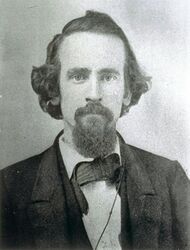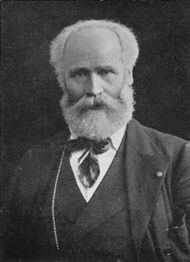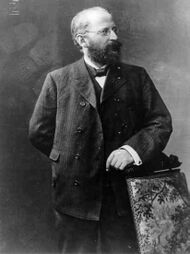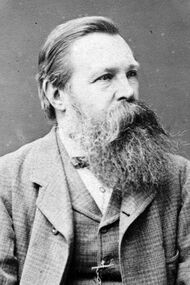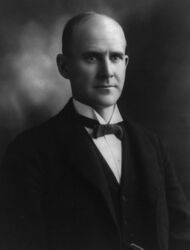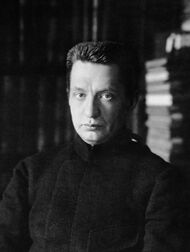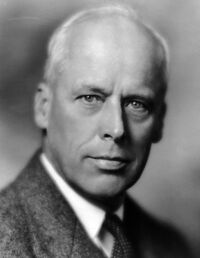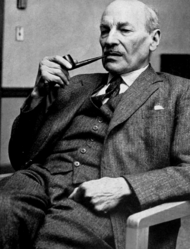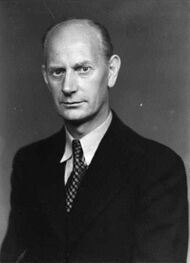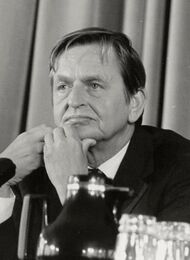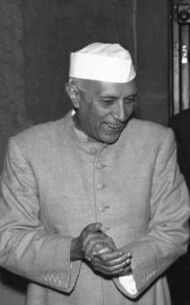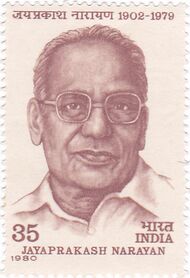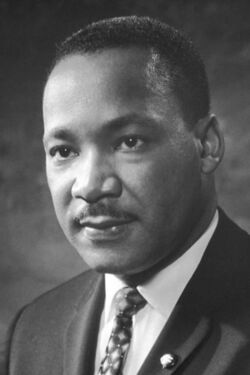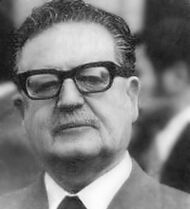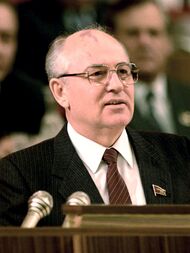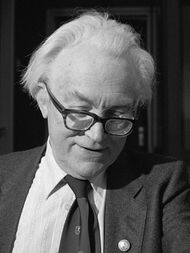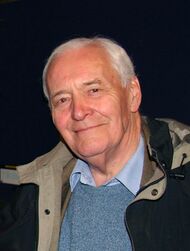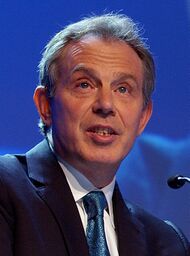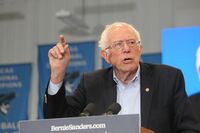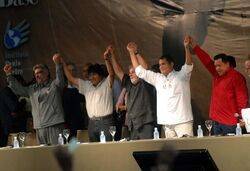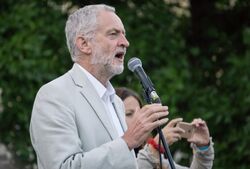Social:History of democratic socialism
| Part of a series on |
| Socialism |
|---|
 |
|
|
Democratic socialism represents the modernist development of socialism and its outspoken support for democracy. The origins of democratic socialism can be traced back to 19th-century utopian socialist thinkers and the Chartist movement in Great Britain, which somewhat differed in their goals but shared a common demand of democratic decision making and public ownership of the means of production, and viewed these as fundamental characteristics of the society they advocated for.[1] Democratic socialism was also heavily influenced by the gradualist form of socialism promoted by the British Fabian Society and Eduard Bernstein's evolutionary socialism.({{{1}}}, {{{2}}})
In the 19th century, democratic socialism was repressed by many governments; countries such as Germany and Italy banned democratic socialist parties.[2][3] With the expansion of liberal democracy and universal suffrage during the 20th century, democratic socialism became a mainstream movement which expanded across the world. Democratic socialists played a major role in liberal democracy,[4] often forming governing parties or acting as the main opposition party (one major exception being the United States ({{{1}}}, {{{2}}})).
19th century
Background and origins
Socialist models and ideas espousing common or public ownership have existed since antiquity. Fenner Brockway identified three early democratic socialist groups during the English Civil War in his book Britain's First Socialists, namely the Levellers, who were pioneers of political democracy and the sovereignty of the people; the Agitators, who were the pioneers of participatory control by the ranks at their workplace, and the Diggers, who were pioneers of communal ownership, cooperation and egalitarianism.({{{1}}}, {{{2}}}) The philosophy and tradition of the Diggers and the Levellers was continued in the period described by E. P. Thompson in The Making of the English Working Class by Jacobin groups like the London Corresponding Society and by polemicists such as Thomas Paine.[5] Their concern for both democracy and social justice marked them out as key precursors of democratic socialism.({{{1}}}, {{{2}}})
The first self-conscious socialist movements developed in the 1820s and 1830s. Western European social critics, including Robert Owen, Charles Fourier, Pierre-Joseph Proudhon, Louis Blanc, Charles Hall, and Henri de Saint-Simon, were the first modern socialists who criticised the excessive poverty and inequality generated by the Industrial Revolution. The first advocates of socialism favoured social levelling in order to create a meritocratic or technocratic society based on individual talent as opposed to aristocratic privilege. Saint-Simon is regarded as the first individual to coin the term socialism.[6] Saint-Simon was fascinated by the enormous potential of science and technology and advocated a socialist society that would eliminate the disorderly aspects of capitalism and would be based on equal opportunities.[7] He advocated the creation of a society in which each person was ranked according to his or her capacities and rewarded according to his or her work.[6] The key focus of Saint-Simon's socialism was on administrative efficiency and industrialism and a belief that science was the key to the progress of human civilisation.[8] This was accompanied by a desire to implement a rationally organised economy based on planning and geared towards large-scale scientific progress and material progress, embodying a desire for a more directed or planned economy.[6]
The term "socialism" was first used in English in the British Cooperative Magazine in 1827 and came to be associated with the followers of Owen such as the Rochdale Pioneers, who founded the co-operative movement. Owen's followers stressed both participatory democracy and economic socialisation in the form of consumer co-operatives, credit unions, and mutual aid societies. In the case of the Owenites, they also overlapped with a number of other working-class and labour movements such as the Chartists in the United Kingdom.[9]
The Chartists gathered significant numbers around the People's Charter of 1838 which demanded the extension of suffrage to all male adults. Leaders in the movement also called for a more equitable distribution of income and better living conditions for the working classes. The very first trade unions and consumers' cooperative societies also emerged in the hinterland of the Chartist movement as a way of bolstering the fight for these demands.[10]
The Chartists were part of a Europe-wide wave of agitation for social reform and democratic rule, which peaked in the Revolutions of 1848. In France , the voice of this movement was La Montagne, also known as the Democratic Socialists. Karl Marx disliked La Montagne, viewing it as a party dominated by the middle class; he called them Sozialdemokrat, the first recorded use of the term social democracy.[11]
Around the same time, the British political philosopher John Stuart Mill also came to advocate a form of economic socialism within a liberal context known as liberal socialism. In later editions of Principles of Political Economy (1848), Mill would argue that "as far as economic theory was concerned, there is nothing in principle in economic theory that precludes an economic order based on socialist policies."({{{1}}}, {{{2}}})
Later, the American social reformer Henry George[1] and his geoist movement influenced the development of democratic socialism,({{{1}}}, {{{2}}}) especially in relation to British socialism[12] and Fabianism,[13] along with Mill and the German historical school of economics.({{{1}}}, {{{2}}})
1880s-1900s
By the 1880s, these threads had cohered into a socialist movement, with major parties emerging in countries such as Britain and Germany. In 1889 (the centennial of the French Revolution of 1789), the Second International was founded, with 384 delegates from twenty countries representing about 300 labour and socialist organisations.[14] It was termed the Socialist International and Friedrich Engels was elected honorary president at the third congress in 1893. Anarchists were ejected and not allowed in mainly due to pressure from Marxists.[15] Anarchist writer George Woodcock has argued that at some point the Second International turned "into a battleground over the issue of libertarian versus authoritarian socialism. Not only did they effectively present themselves as champions of minority rights; they also provoked the German Marxists into demonstrating a dictatorial intolerance which was a factor in preventing the British labour movement from following the Marxist direction indicated by such leaders as H. M. Hyndman."[16]
In Britain
In the United Kingdom, the democratic socialist tradition was represented by William Morris's Socialist League (founded 1884) and the Fabian Society (1885) and later the Independent Labour Party founded by Keir Hardie in the 1890s, of which writer George Orwell would later become a prominent member.({{{1}}}, {{{2}}})
The Fabian Society is a British socialist organisation which was established with the purpose of advancing the principles of socialism via gradualist and reformist means.[17] The society functions primarily as a think tank and is one of the fifteen socialist societies affiliated with the Labour Party. Similar societies exist in Australia (the Australian Fabian Society), in Canada (the Douglas-Coldwell Foundation, and the since disbanded League for Social Reconstruction) and in New Zealand. The society laid many of the foundations of the Labour Party and subsequently affected the policies of states emerging from the decolonisation of the British Empire, most notably India and Singapore. Originally, the Fabian Society was committed to the establishment of a socialist economy, alongside a commitment to British imperialism and colonialism as a progressive and modernising force.[18]
In Germany
In Germany, democratic socialism became a prominent movement at the end of the 19th century, when the Eisenach's Social Democratic Workers' Party of Germany merged with Lassalle's General German Workers' Association in 1875 to form the Social Democratic Party of Germany. Reformism arose as an alternative to revolution, with leading social democrat Eduard Bernstein proposing the concept of evolutionary socialism. Revolutionary socialists, encompassing multiple social and political movements that may define revolution differently from one another, quickly targeted the nascent ideology of reformism and Rosa Luxemburg condemned Bernstein's Evolutionary Socialism in her 1900 essay titled Social Reform or Revolution? The Social Democratic Party of Germany became the largest and most powerful socialist party in Europe despite being an illegal organisation under Otto von Bismarck's Anti-Socialist Laws.[19] until these were repealed in 1890. In the 1893 German federal election, the party gained about 1,787,000 votes, a quarter of the total votes cast according to Engels. In 1895, the year of his death, Engels highlighted The Communist Manifesto's emphasis on winning as a first step the "battle of democracy."({{{1}}}, {{{2}}})
In his introduction to the 1895 edition of Karl Marx's The Class Struggles in France, Engels attempted to resolve the division between gradualist reformist and revolutionary socialists in the Marxist movement by declaring that he was in favour of short-term tactics of electoral politics that included gradualist and evolutionary socialist policies while maintaining his belief that revolutionary seizure of power by the proletariat should remain a key goal of the socialist movement. In spite of this attempt by Engels to merge gradualism and revolution, his effort only diluted the distinction of gradualism and revolution and had the effect of strengthening the position of the revisionists.[20] Engels' statements in the French newspaper Le Figaro in which he argued that "revolution" and the "so-called socialist society" were not fixed concepts, but rather constantly changing social phenomena and said that this made "us [socialists] all evolutionists", increased the public perception that Engels was gravitating towards evolutionary socialism. Engels also wrote that it would be "suicidal" to talk about a revolutionary seizure of power at a time when the historical circumstances favoured a parliamentary road to power which he predicted could happen "as early as 1898."({{{1}}}, {{{2}}})
Engels' stance of openly accepting gradualist, evolutionary and parliamentary tactics while claiming that the historical circumstances did not favour revolution caused confusion among political commentators and the public. Bernstein interpreted this as indicating that Engels was moving towards accepting parliamentary reformist and gradualist stances, but he ignored that Engels' stances were tactical as a response to the particular circumstances at that time and that Engels was still committed to revolutionary socialism. Engels was deeply distressed when he discovered that his introduction to a new edition of The Class Struggles in France had been edited by Bernstein and Karl Kautsky in a manner which left the impression that he had become a proponent of a peaceful road to socialism.[20] On 1 April 1895, four months before his death, Engels responded to Kautsky:
I was amazed to see today in the Vorwärts an excerpt from my 'Introduction' that had been printed without my knowledge and tricked out in such a way as to present me as a peace-loving proponent of legality [at all costs]. Which is all the more reason why I should like it to appear in its entirety in the Neue Zeit in order that this disgraceful impression may be erased. I shall leave Liebknecht in no doubt as to what I think about it and the same applies to those who, irrespective of who they may be, gave him this opportunity of perverting my views and, what's more, without so much as a word to me about it.[21]
Early 20th century
Early democratic success and development
In Argentina, the Socialist Party was established in the 1890s, being led by Juan B. Justo and Nicolás Repetto, among others, becoming the first mass party in the country and in Latin America. The party affiliated itself with the Second International.[22] Between 1924 and 1940, it was one of the many socialist party members of the Labour and Socialist International (LSI), the forerunner of the present-day Socialist International.[23] In 1904, Australians elected Chris Watson as the first Prime Minister from the Australian Labor Party, becoming the first democratic socialist elected into office. The British Labour Party first won seats in the House of Commons in 1902. By 1917, the patriotism of World War I changed into political radicalism in Australia, most of Europe and the United States. Other socialist parties from around the world who were beginning to gain importance in their national politics in the early 20th century included the Italian Socialist Party, the French Section of the Workers' International, the Spanish Socialist Workers' Party, the Swedish Social Democratic Party, the Russian Social Democratic Labour Party, the Socialist Party of America and the Chilean Socialist Workers' Party.
The socialist industrial unionism of Daniel De Leon in the United States represented another strain of early democratic socialism in this period. It favoured a form of government based on industrial unions, but it also sought to establish a socialist government after winning at the ballot box.[24] Democratic socialism continued to flourish in the Socialist Party of America, especially under the leadership of Norman Thomas.[25][26] The Socialist Party of America was formed in 1901 after a merger between the three-year-old Social Democratic Party of America and disaffected elements of the Socialist Labor Party of America which had split from the main organisation in 1899. The Socialist Party of America was also known at various times in its long history as the Socialist Party of the United States (as early as the 1910s) and Socialist Party USA (as early as 1935, most common in the 1960s), but the official party name remained Socialist Party of America.[27] Eugene V. Debs twice won over 900,000 votes in the 1912 presidential elections and increased his portion of the popular vote to over 1,000,000 in the 1920 presidential election despite being imprisoned for alleged sedition. The Socialist Party of America also elected two Representatives (Victor L. Berger and Meyer London), dozens of state legislators, more than hundred mayors and countless minor officials.[28] Furthermore, the city of Milwaukee has been led by a series of democratic socialist mayors in the early 20th century, namely Frank Zeidler, Emil Seidel and Daniel Hoan.({{{1}}}, {{{2}}})
Russian Revolution and aftermath
In February 1917, revolution broke out in Russia in which workers, soldiers and peasants established soviets, the monarchy was forced into exile fell and a provisional government was formed until the election of a constituent assembly. Alexander Kerensky, a Russian lawyer and revolutionary, became a key political figure in the Russian Revolution of 1917. After the February Revolution, Kerensky joined the newly formed Russian Provisional Government, first as Minister of Justice, then as Minister of War and after July as the government's second Minister-Chairman. A leader of the moderate socialist Trudovik faction of the Socialist Revolutionary Party known as the Labour Group, Kerensky was also the vice-chairman of the powerful Petrograd Soviet. After failing to sign a peace treaty with the German Empire to exit from World War I which led to massive popular unrest against the government cabinet, Kerensky's government was overthrown on 7 November by the Bolsheviks led by Vladimir Lenin in the October Revolution. Soon after the October Revolution, the Russian Constituent Assembly elected Socialist-Revolutionary leader Victor Chernov as President of a Russian Republic, but it rejected the Bolshevik proposal that endorsed the Soviet decrees on land, peace and workers' control and acknowledged the power of the Soviets of Workers', Soldiers' and Peasants' Deputies.[29]
As a result of the 1917 Russian Constituent Assembly election which saw a landslide victory for the Socialist-Revolutionaries, the Bolsheviks declared on the next day that the assembly was elected based on outdated party lists which did not reflect the Socialist Revolutionary Party split into Left and Right Socialist-Revolutionary factions. The Left Socialist-Revolutionaries were allied with the Bolsheviks.[30] The All-Russian Central Executive Committee of the Soviets promptly dissolved the Russian Constituent Assembly.({{{1}}}, {{{2}}})
The International Socialist Commission (ISC) was formed in February 1919 at a meeting in Bern, Switzerland by parties that wanted to resurrect the Second International.[31] At a conference held on 27 February 1921 in Vienna, parties which did not want to be a part of the Communist International or the resurrected Second International formed the International Working Union of Socialist Parties (IWUSP).[32] The ISC and the IWUSP eventually joined to form the LSI in May 1923 at a meeting held Hamburg.[33]
Left-wing groups which did not agree to the centralisation and abandonment of the soviets by the Bolshevik Party led left-wing uprisings against the Bolsheviks. Such groups included anarchists, Left Socialist-Revolutionaries, Mensheviks and Socialist-Revolutionaries.({{{1}}}, {{{2}}}) Amidst this left-wing discontent, the most large-scale events were the workers' Kronstadt rebellion({{{1}}}, {{{2}}}) and the anarchist-led Makhnovshchina in Ukraine.({{{1}}}, {{{2}}})
In 1922, the 4th World Congress of the Communist International took up the policy of the united front, urging Communists to work with rank and file social democrats while remaining critical of their party leaders, whom they criticised for betraying the working class by supporting the war efforts of their respective capitalist classes. For their part, the social democrats pointed to the dislocation and chaos caused by revolution and later the growing authoritarianism of the Communist parties after they achieved power. When the Communist Party of Great Britain applied to affiliate with the Labour Party in 1920, it was turned down. On seeing the Soviet Union's growing coercive power in 1923, a dying Lenin stated that Russia had reverted to a "bourgeois tsarist machine ... barely varnished with socialism."[34] After Lenin's death in January 1924, the Communist Party of the Soviet Union, increasingly falling under the control of Joseph Stalin , rejected the theory that socialism could not be built solely in the Soviet Union in favour of the concept of socialism in one country.[35]
In other parts of Europe, many democratic socialist parties were united in the IWUSP in the early 1920s and in the London Bureau in the 1930s, along with many other socialists of different tendencies and ideologies. These socialist internationals sought to steer a centrist course between the revolutionaries and the social democrats of the Second International and the perceived anti-democratic Communist International. In contrast, the social democrats of the Second International were seen as insufficiently socialist and had been compromised by their support for World War I. The key movements within the IWUSP were the Austromarxists and the British Independent Labour Party.({{{1}}}, {{{2}}})
In the early 1920s, the guild socialism of G. D. H. Cole attempted to envision a socialist alternative to Soviet-style authoritarianism, while council communism articulated democratic socialist positions in several respects, notably through renouncing the vanguard role of the revolutionary party and holding that the system of the Soviet Union was not authentically socialist.[36]
1930s and WWII
Democratic socialism advanced in many industrial democracies in the 1930s, appealing to workers suffering as a result of the Great Depression. In Britain's general election of 1929 the Labour Party won 288 seats out of 615 and formed a minority government. The Great Depression of that period brought high unemployment and Labour Prime Minister Ramsay MacDonald sought to make cuts in order to balance the budget. The trade unions opposed MacDonald's proposed cuts and he split the Labour government to form the National Government of 1931. This experience moved the Labour Party leftward. The Independent Labour Party (ILP) remained outside the Labour Party, although remained affiliated to it. It promoted a "Socialism in our time" platform centred around a living wage and nationalisation. As the Depression deepened, it became increasingly dissatisfied with Labour's gradualism, and disaffiliated in 1932, after which its membership declined and it suffered from a series of splinters.[37][38][39][40] Also in 1932, the ILP co-founded the London Bureau of left-socialist parties, later called the International Revolutionary Marxist Centre or "Three-and-a-Half International", administered by the ILP and chaired by its leader, Fenner Brockway, for most of its existence; the main forces in the London Bureau were the ILP and Spain's Workers' Party of Marxist Unification (POUM).({{{1}}}, {{{2}}})
In France, the French Section of the Workers' International (SFIO) was pulled between right-wing factions promoting a more top-down planned economy (Neosocialism, Nonconformism and left-wing factions urging more revolutionary solutions (Bataille socialiste and Marceau Pivert's Gauche révolutionnaire). The party entered into [[Cartel des Gauches|alliance]] with groups to its right, who formed a coalition government in 1932. In Canada , the Co-operative Commonwealth Federation (CCF) was founded in 1932 as an agrarian socialist party. Its first platform was the Regina Manifesto, adopted in 1930. The CCF gained popularity among industrial workers throughout the 1930s. In 1944, the Saskatchewan wing of the party formed the first Socialist government in a Canadian province and stayed in power until 1964.
In the United States, the New Deal liberalism of President Franklin D. Roosevelt won mass support leaving socialists unable to gain significant ground. Norman Thomas of the Socialist Party of America (SPA) attracted nearly 188,000 votes in his 1936 run for president, but performed poorly in historic strongholds of the party and the Socialist Party of America's membership had begun to decline.[41] Meanwhile, the Trotskyist movement, followed a policy known as the French Turn, a strategy of entryism in democratic socialist parties such as the SPA, SFIO and ILP, pulling these to the left in some places.
However, fascism was also advancing. In Germany, it was the fascists of Adolf Hitler's Nazi Party who successfully exploited the Depression to win power, in January 1933. Hitler's regime swiftly destroyed both the German Communist Party and the Social Democratic Party, the worst blow the world socialist movement had ever suffered. This forced Stalin to reassess his strategy, and after its 7th World Congress in 1935 the Comintern began urging a popular front against fascism. The socialist parties were at first suspicious, given the bitter hostility of the 1920s, but eventually effective Popular Fronts were formed in both France and Spain. In Italy, the Italian Socialist Party (PSI) established an alliance with the Communists and it gradually cooperated with conservative reformists, revolutionaries, and syndicalists.[42] In France, the Popular Front, headed by the SFIO's Léon Blum, won the 3 May 1936 election, leading to a government composed of Radical and Socialist ministers. On 8 June 1936, the Matignon Accords granted the 40 hours workweek to the workers, as well as right of collective bargaining, right of strike action, and dismantled all laws preventing organization of trade-unions.
Elsewhere, democratic socialists remained hostile to Stalinism and rejected the popular front strategy. For example, the Communist Party leader Earl Russell Browder offered to be Thomas' running mate on a joint Socialist Party–Communist Party ticket, but Thomas rejected this overture.
After the election of a Popular Front government in Spain in 1936 a fascist military revolt led to the Spanish Civil War. Democratic socialists from around the world fought on the side of the Republican government, for instance in the ILP Contingent of the International Brigades, in which George Orwell served.
The crisis in Spain also brought down Blum's Popular Front government in France and ultimately the Popular Fronts were not able to prevent the spread of fascism or the aggressive plans of the fascist powers.
Mid-20th century
Post-war governments
After World War II, democratic socialist, labourist and social-democratic governments introduced social reforms and wealth redistribution via welfare state social programmes and progressive taxation. Those parties dominated post-war politics in the Nordic countries and countries such as Belgium, Czechoslovakia, France, Italy and the United Kingdom. At one point, France claimed the world's most state-controlled capitalist country, starting a period of unprecedented economic growth known as the Trente Glorieuses, part of the post-war economic boom set in motion by the Keynesian consensus. The public utilities and industries nationalised by the French government included Air France, the Bank of France, Charbonnages de France, Électricité de France, Gaz de France and Régie Nationale des Usines Renault.[43] Outside Europe, the Japan Socialist Party was briefly in power in 1947.
In 1945, the British Labour Party led by Clement Attlee was elected to office based on a radical, democratic socialist programme. The Labour government nationalised major public utilities and industries such as mining, gas, coal, electricity, rail, iron, steel and the Bank of England. British Petroleum was officially nationalised in 1951.[44] In 1956, Anthony Crosland stated that at least 25% of British industry was nationalised and that public employees, including those in nationalised industries, constituted a similar proportion of the country's total workforce.[45] The 1964–1970 and 1974–1979 Labour governments strengthened the policy of nationalisation.[46] These Labour governments renationalised steel (British Steel) in 1967 after the Conservatives had privatised it and nationalised car production (British Leyland) in 1976.[47] The 1945–1951 Labour government also established National Health Service which provided taxpayer-funded health care to Every British citizen, free at the point of use.[48] High-quality housing for the working class was provided in council housing estates and university education became available to every citizen via a school grant system.[49] The 1945–1951 Labour government has been described as being transformative democratic socialist.[50]
During most of the post-war era, democratic socialist, labourist and social-democratic parties dominated the political scene and laid the ground to universalistic welfare states in the Nordic countries.({{{1}}}, {{{2}}}) For much of the mid- and late 20th century, Sweden was governed by the Swedish Social Democratic Party largely in cooperation with trade unions and industry.[51] Tage Erlander was the leader of the Social Democratic Party and led the government from 1946 until 1969, an uninterrupted tenure of twenty-three years, one of the longest in any democracy. From 1945 until 1962, the Norwegian Labour Party held an absolute majority in the parliament led by Einar Gerhardsen, who served Prime Minister for seventeen years. The Danish Social Democrats governed Denmark for most of the 20th century and since the 1920s and through the 1940s and the 1970s a large majority of Prime Ministers were members of the Social Democrats, the largest and most popular political party in Denmark.({{{1}}}, {{{2}}})
This particular adaptation of the mixed economy, better known as the Nordic model, is characterised by more generous welfare states (relative to other developed countries) which are aimed specifically at enhancing individual autonomy, ensuring the universal provision of basic human rights and stabilising the economy. It is distinguished from other welfare states with similar goals by its emphasis on maximising labour force participation, promoting gender equality, egalitarian and extensive benefit levels, large magnitude of redistribution and expansionary fiscal policy.[52] In the 1950s, popular socialism emerged as a vital current of the left in Nordic countries could be characterised as a democratic socialism in the same vein as it placed itself between communism and social democracy.[53] In the 1960s, Gerhardsen established a planning agency and tried to establish a planned economy.[54] Prominent Swedish Prime Minister Olof Palme identified himself as a democratic socialist.[55]
The Rehn–Meidner model was adopted by the Swedish Social Democratic Party in the late 1940s. This economic model allowed capitalists who owned very productive and efficient firms to retain excess profits at the expense of the firm's workers, exacerbating income inequality and causing workers in these firms to agitate for a better share of the profits in the 1970s. Women working in the state sector also began to assert pressure for better and equal wages.[56] In 1976, economist Rudolf Meidner established a study committee that came up with a proposal called the Meidner Plan which entailed the transferring of the excess profits into investment funds controlled by the workers in said efficient firms, with the goal that firms would create further employment and pay workers higher wages in return rather than unduly increasing the wealth of company owners and managers.[8] Capitalists immediately denounced the proposal as socialism and launched an unprecedented opposition and smear campaign against it, threatening to terminate the class compromise established in the 1938 Saltsjöbaden Agreement.[57]
Anti-colonialism and revolutions
The Hungarian Revolution of 1956 was a spontaneous nationwide revolt by democratic socialists against the Marxist–Leninist government of the People's Republic of Hungary and its policies of repression, lasting from 23 October until 10 November 1956.({{{1}}}, {{{2}}}) Soviet leader Nikita Khrushchev's denunciation of the excesses of Stalin's regime during the 20th Congress of the Communist Party of the Soviet Union that same year[58] as well as the revolt in Hungary produced ideological fractures and disagreements within the democratic communist and socialist parties of Western Europe. A split ensued within the Italian Communist Party (PCI), with most ordinary members and the PCI leadership, including Giorgio Napolitano and Palmiro Togliatti, regarding the Hungarian insurgents as counter-revolutionaries as reported in l'Unità, the official PCI newspaper.[59]
Giuseppe Di Vittorio, General Secretary of the Italian General Confederation of Labour, repudiated the leadership position, as did the prominent party members Loris Fortuna, Antonio Giolitti and many other influential communist intellectuals who later were expelled or left the party.({{{1}}}, {{{2}}}) Pietro Nenni, the national secretary of the Italian Socialist Party, a close ally of the PCI, opposed the Soviet intervention as well.[60] Napolitano, elected in 2006 as President of the Italian Republic, wrote in his 2005 political autobiography that he regretted his justification of Soviet action in Hungary and that at the time he believed in party unity and the international leadership of Soviet communism.[61]
Within the Communist Party of Great Britain, dissent that began with the repudiation of Stalin by John Saville and E. P. Thompson, influential historians and members of the Communist Party Historians Group, culminated in a loss of thousands of party members as events unfolded in Hungary. Peter Fryer, correspondent for the party newspaper The Daily Worker, reported on the violent suppression of the uprising, but his dispatches were heavily censored. Fryer resigned from the paper upon his return and was later expelled from the party.[62] In France, moderates such as historian Emmanuel Le Roy Ladurie resigned, questioning the policy of supporting Soviet actions by the French Communist Party. The French anarchist philosopher and writer Albert Camus wrote an open letter titled The Blood of the Hungarians, criticising the West's lack of action. Jean-Paul Sartre, still a determined party member, criticised the Soviets.({{{1}}}, {{{2}}})
In the post-war years, socialism became increasingly influential throughout the so-called Third World after decolonisation. During India's freedom movement and fight for independence, many figures in the leftist faction of the Indian National Congress organised themselves as the Congress Socialist Party. Their politics and those of the early and intermediate periods of Jayaprakash Narayan's career combined a commitment to the socialist transformation of society with a principled opposition to the one-party authoritarianism they perceived in the Stalinist model.({{{1}}}, {{{2}}}) In Africa, many independence movements (e.g. in Senegal, under the leadership of Léopold Sédar Senghor, in Ghana under the leadership of Kwame Nkrumah, in Guinea under Ahmed Sékou Touré and in Tanzania, under the leadership of Julius Nyerere, who developed the concept of Ujamaa, co-operative economoics) were heavily influenced by democratic socialism, although often drifting away from democracy after taking power.[63]
Embracing a new ideology called Third World socialism, countries in Africa, Asia and Latin America often nationalised industries held by foreign owners. In addition, the New Left, a movement composed of activists, educators, agitators and others who sought to implement a broad range of social reforms on issues such as gay rights, abortion, gender roles and drugs,[64] in contrast to earlier leftist or Marxist movements that had taken a more vanguardist approach to social justice and focused mostly on labour unionisation and issues related to class, became prominent in the 1960s and 1970s.({{{1}}}, {{{2}}}) The New Left rejected involvement with the labour movement and Marxism's historical theory of class struggle.[65]
The 1960s and the New Left
In the United States, the New Left was associated with the anti-war and hippie movements as well as the black liberation movements such as the Black Panther Party.[66] While initially formed in opposition to the so-called Old Left of the Democratic Party, groups composing the New Left gradually became central players in the Democratic coalition, culminating in the nomination of the outspoken anti-Vietnam War George McGovern at the Democratic Party primaries[67] for the 1972 United States presidential election.[64] US civil rights leader Martin Luther King Jr. supported the ideals of democratic socialism, although he was reluctant to speak directly of this support due to the anti-communist sentiment being projected throughout the United States at the time, and the association of socialism with communism. King believed that capitalism could not adequately provide the necessities of many American people, particularly the African-American community.[68][69] King expressed that "the evils of capitalism are as real as the evils of militarism and evils of racism".[70][71]
The protest wave of 1968 represented a worldwide escalation of social conflicts, predominantly characterised by popular rebellions against military dictatorships, capitalists and bureaucratic elites, who responded with an escalation of political repression and authoritarianism. These protests marked a turning point for the civil rights movement in the United States which produced revolutionary movements like the Black Panther Party. The prominent civil rights leader Martin Luther King Jr. organised the Poor People's Campaign to address issues of economic and social justice[72] while personally showing sympathy with democratic socialism.[73] The classic Port Huron Statement of the Students for a Democratic Society combined a stringent critique of the Stalinist model with calls for a democratic socialist reconstruction of society.({{{1}}}, {{{2}}})
In reaction to the Tet Offensive, protests also sparked a broad movement in opposition to the Vietnam War all over the United States and even into London, Paris, Berlin and Rome. Mass socialist or communist movements grew not only in the United States, but also in most European countries. The most spectacular manifestation of this was the May 1968 protests in France in which students linked up with strikes of up to ten million workers and the movement seemed capable of overthrowing the government, albeit for only a few days. In many other capitalist countries, struggles against dictatorships, state repression and colonisation were also marked by protests in 1968 such as the beginning of the Troubles in Northern Ireland, the Tlatelolco massacre in Mexico City and the escalation of guerrilla warfare against the military dictatorship in Brazil.[74] Countries governed by Marxist–Leninist parties had protests against bureaucratic and military elites. In Eastern Europe, there were widespread protests that escalated particularly in the Prague Spring in Czechoslovakia.[75] In response, the Soviet Union occupied Czechoslovakia, but the occupation was denounced by the Italian and French communist parties as well as the Communist Party of Finland.({{{1}}}, {{{2}}})
Late 20th century
Neoliberal counterrevolution and end of Cold War
In Latin America, liberation theology is a socialist tendency within the Roman Catholic Church that emerged in the 1960s.({{{1}}}, {{{2}}}) In Chile, Salvador Allende, a physician and candidate for the Socialist Party of Chile, became the first democratically elected Marxist President after presidential elections were held in 1970. However, his government was ousted three years later in a military coup backed by the CIA and the United States government, instituting the right-wing dictatorship of Augusto Pinochet which lasted until the late 1980s.({{{1}}}, {{{2}}}) In addition, Michael Manley, a self-described democratic socialist, served as the fourth Prime Minister of Jamaica from 1972 to 1980 and from 1989 to 1992. According to opinion polls, he remains one of Jamaica's most popular Prime Ministers since independence.[76]
Eurocommunism became a trend in the 1970s and 1980s in various Western European communist parties({{{1}}}, {{{2}}}) which intended to develop a modernised theory and practice of social transformation that was more relevant for a Western European country and less aligned to the influence or control of the Communist Party of the Soviet Union.({{{1}}}, {{{2}}}) Outside of Western Europe, it is sometimes referred to as neocommunism.[77] Some communist parties with strong popular support, notably the Italian Communist Party and the Communist Party of Spain, enthusiastically adopted Eurocommunism and the Communist Party of Finland was dominated by Eurocommunists.[78]
In the late 1970s and in the 1980s, the Socialist International had extensive contacts and held discussion with the two powers of the Cold War, the United States and the Soviet Union, regarding the relations between the East and West, along with arms control. Since then, the Socialist International has admitted as member parties the Nicaraguan Sandinista National Liberation Front and the left-wing Puerto Rican Independence Party as well as former communist parties such as the Italian Democratic Party of the Left and the Front for the Liberation of Mozambique. The Socialist International aided social democratic parties in re-establishing themselves after right-wing dictatorships were toppled in Portugal and Spain, respectively in 1974 and 1975. Until its 1976 congress in Geneva, the Socialist International had few members outside Europe and no formal involvement with Latin America.[79]
In the United States, the Social Democrats, USA, an association of reformist social democrats and democratic socialists, was founded in 1972. The Socialist Party of America had stopped running independent presidential candidates and begun reforming itself towards democratic socialism. Consequently, the party's name was changed because it had confused the public. With the name change in place, the Social Democrats, USA clarified its vision to Americans who confused democratic socialism with Marxism–Leninism, harshly opposed by the organisation.({{{1}}}, {{{2}}}) In 1983, the Democratic Socialists of America was founded as a merger of the Democratic Socialist Organizing Committee({{{1}}}, {{{2}}}) with the New American Movement,[80] an organization of New Left veterans.({{{1}}}, {{{2}}}) Earlier in 1973, Michael Harrington and Irving Howe formed the Democratic Socialist Organizing Committee which articulated a democratic socialist message({{{1}}}, {{{2}}}) while a smaller faction associated with peace activist David McReynolds formed the Socialist Party USA.[81] Harrington and the socialist-feminist author Barbara Ehrenreich were elected as the first co-chairs of the organisation[82] which does not stand its own candidates in elections and instead "fights for reforms ... that will weaken the power of corporations and increase the power of working people."[83]
In Greece, the Panhellenic Socialist Movement, better known as PASOK, was founded on 3 September 1974 by Andreas Papandreou as a democratic socialist, left-wing nationalist, Venizelist and social democratic({{{1}}}, {{{2}}}) party following the collapse of the military dictatorship of 1967–1974.[84] As a result of the 1981 legislative election, PASOK became Greece's first centre-left party to win a majority in the Hellenic Parliament and the party would later pass several important economic and social reforms that would reshape Greece in the years ahead until its collapse in the 2010s.[85]
During the 1980s, Soviet leader Mikhail Gorbachev intended to move the Soviet Union towards Nordic-style social democracy,[86] calling it a "socialist beacon for all mankind."({{{1}}}, {{{2}}}) Prior to its dissolution in 1991, the Soviet Union had the second largest economy in the world after the United States.[87] After the dissolution of the Soviet Union, the economic integration of the Soviet republics was dissolved and industrial activity suffered a substantial decline.[88] A lasting legacy of the Soviet Union remains physical infrastructure created during decades of policies geared towards the construction of heavy industry and widespread environmental destruction.[89]
Opposition to neoliberalism and Third Way
Many social-democratic parties, particularly after the Cold War, adopted neoliberal economic policies,({{{1}}}, {{{2}}}) including austerity, deregulation, financialisation, free trade, privatisation and welfare reforms such as workfare, experiencing a drastic decline in the 2010s after their successes in the 1990s and 2000s({{{1}}}, {{{2}}}) in a phenomenon known as Pasokification.[85] As monetarists and neoliberals attacked social welfare systems as impediments to private entrepreneurship, prominent social-democratic parties abandoned their pursuit of moderate socialism in favour of economic liberalism.({{{1}}}, {{{2}}}) This resulted in the rise of more left-wing and democratic socialist parties that rejected neoliberalism and the Third Way.({{{1}}}, {{{2}}}) In the United Kingdom, prominent democratic socialists within the Labour Party such as Michael Foot and Tony Benn put forward democratic socialism into an actionable manifesto during the 1970s and 1980s, but this was voted overwhelmingly against in the 1983 general election after Margaret Thatcher's victory in the Falklands War and the manifesto was referred to as "the longest suicide note in history."[90]
By the 1980s, with the rise of conservative neoliberal politicians such as Ronald Reagan in the United States, Margaret Thatcher in Britain, Brian Mulroney in Canada and Augusto Pinochet in Chile, the Western welfare state was attacked from within, but state support for the corporate sector was maintained.[91] According to Kristen Ghodsee, the triumphalist attitudes of Western powers at the end of the Cold War and the fixation with linking all leftist and socialist ideals with the excesses of Stalinism allowed neoliberalism to fill the void. This undermined democratic institutions and reforms, leaving a trail of economic misery, unemployment, hopelessness and rising economic inequality throughout the former Eastern Bloc and much of the West in the following decades. With democracy weakened and the anti-capitalist left marginalised, the anger and resentment which followed the period of neoliberalism was channeled into extremist nationalist movements in both the former and the latter.({{{1}}}, {{{2}}})
As a result of the party's shift,({{{1}}}, {{{2}}}) Labour Party leader Neil Kinnock made a public attack against the entryist group Militant({{{1}}}, {{{2}}}) at the 1985 Labour Party conference in Bournemouth.({{{1}}}, {{{2}}}) The Labour Party ruled that Militant was ineligible for affiliation with the Labour Party and the party gradually expelled Militant supporters.[92] The Kinnock leadership had refused to support the 1984–1985 miner's strike over pit closures,[93] a decision that the party's left-wing and the National Union of Mineworkers blamed for the strike's eventual defeat.[94]
In 1989, the Socialist International adopted a new Declaration of Principles at its 18th congress in Stockholm, Sweden, stating: "Democratic socialism is an international movement for freedom, social justice, and solidarity. Its goal is to achieve a peaceful world where these basic values can be enhanced and where each individual can live a meaningful life with the full development of his or her personality and talents, and with the guarantee of human and civil rights in a democratic framework of society."[95] Within the Labour Party, the democratic socialist label was used historically by those who identified with the tradition represented by the Independent Labour Party, the soft left of non-Marxist socialists such as Michael Foot around the Tribune magazine and some of the hard left in the Campaign Group around Tony Benn.({{{1}}}, {{{2}}}) The Campaign Group, along with the Socialist Society led by Raymond Williams and others, formed the Socialist Movement in 1987 which now produces the magazine Red Pepper.({{{1}}}, {{{2}}})
In the late 1990s, the Labour Party under the leadership of Tony Blair enacted policies based on the liberal market economy with the intention of delivering public services via the private finance initiative. Influential in these policies was the idea of a Third Way which called for a re-evaluation and reduction of welfare state policies.[96] In 1995, the Labour Party re-defined its position on socialism by re-wording Clause IV of their Constitution, effectively removing all references to public, direct worker or municipal ownership of the means of production and now reading: "The Labour Party is a democratic socialist party. It believes that, by the strength of our common endeavour we achieve more than we achieve alone, so as to create, for each of us, the means to realise our true potential, and, for all of us, a community in which power, wealth, and opportunity are in the hands of the many, not the few."[97] New Labour eventually won the 1997 United Kingdom general election in a landslide and Blair described New Labour as a "left of centre party, pursuing economic prosperity and social justice as partners and not as opposites."[98] It has been argued that the Labour Party under the Blair ministry effectively governed from the radical centre, something which Blair had promised to do in the 1997 general election.[99]
21st century
Democratic socialists see the purpose of the welfare state as "not merely to provide benefits but to build the foundation for emancipation and self-determination," and the ultimate socialization of the means of production.[100] Despite the overlaps between social democracy and democratic socialism, with social democracy often thought as a form of democratic socialism and social democrats often calling themselves democratic socialists,({{{1}}}, {{{2}}}) this is frequently considered a misnomer.({{{1}}}, {{{2}}})
The Progressive Alliance is a political international organisation founded on 22 May 2013 by left-wing political parties, the majority of which are current or former members of the Socialist International. The organisation states that its aim is becoming the global network of "the progressive, democratic, social-democratic, socialist and labour movement."({{{1}}}, {{{2}}})[non-primary source needed] On 30 November 2018, The Sanders Institute and the Democracy in Europe Movement 2025 founded the Progressive International, an international political organisation which unites democratic socialists with labour unionists, progressives and social democrats.[101]
Africa
African socialism has been a major ideology around the continent and remains so in the present day.[102] Although affiliated with the Socialist International, the African National Congress (ANC) in South Africa abandoned its socialist ideology after gaining power in 1994 and followed a neoliberal route.({{{1}}}, {{{2}}}) From 2005 until 2007, the country was wracked by thousands of protests from poor working-class communities. One of these gave rise to a mass democratic socialist movement of shack dwellers called Abahlali baseMjondolo which continues to work for popular people's planning and against the proliferation of capitalism in land and housing.({{{1}}}, {{{2}}}) In 2013, the National Union of Metalworkers of South Africa, the country's biggest trade union, voted to withdraw support from the AFC and the South African Communist Party and to form an independent socialist party to protect the interests of the working class, resulting in the creation of the United Front.[103]
Other democratic socialist parties in Africa include the Movement of Socialist Democrats, the Congress for the Republic, the Movement of Socialist Democrats and the Democratic Patriots' Unified Party in Tunisia, the Berber Socialism and Revolution Party in Algeria, the Congress of Democrats in Namibia, the National Progressive Unionist Party, the Socialist Party of Egypt, the Workers and Peasants Party, the Workers Democratic Party, the Revolutionary Socialists and the Socialist Popular Alliance Party in Egypt and the Socialist Democratic Vanguard Party in Morocco. Democratic socialists played a major role in the Arab Spring of 2011, especially in Egypt and Tunisia.({{{1}}}, {{{2}}})
Americas
North America
In North America, Canada and the United States represent an unusual case in the Western world in that they were not governed by a socialist party at the federal level.({{{1}}}, {{{2}}}) However, the democratic socialist Co-operative Commonwealth Federation (CCF), the precursor to the social democratic New Democratic Party (NDP), had significant success in provincial Canadian politics.({{{1}}}, {{{2}}}) In 1944, the Saskatchewan CCF formed the first socialist government in North America and its leader Tommy Douglas is known for having spearheaded the adoption of Canada's nationwide system of universal healthcare called Medicare.[104] At the federal level, the NDP was the Official Opposition (2011–2015).[105]
While there have historically been other notable socialist members of Congress and other public offices in the United States, such as former House whip David Bonior, former New York City mayor David Dinkins, and the initial sponsor of the Medicare for All Act, John Conyers, it is widely held that Bernie Sanders was the first to bring democratic socialism into widespread popularity in the United States.({{{1}}}, {{{2}}}) Sanders, who was the 37th Mayor of Burlington and later a member of the United States House of Representatives,({{{1}}}, {{{2}}}) became the first self-described democratic socialist({{{1}}}, {{{2}}}) to be elected to the Senate from Vermont in 2006.(Borger, 2006) In 2016, Sanders made a bid for the Democratic Party presidential candidate, thereby gathering considerable popular support and interest in his campaign and democratic socialism, particularly among the younger generation and the working class.({{{1}}}, {{{2}}}) Although the nomination ultimately went to centrist Hillary Clinton, Sanders ran again in the 2020 Democratic Party presidential primaries,(Kinzel, 2019) briefly becoming the front-runner.({{{1}}}, {{{2}}})
Since his praise of the Nordic model indicated focus on welfare programs as opposed to views involving social ownership,({{{1}}}, {{{2}}}) it has been argued that the term democratic socialism has become a misnomer for social democracy in American politics.({{{1}}}, {{{2}}}) Nonetheless, Sanders has explicitly advocated for some form of public ownership[106] as well as workplace democracy,[107] an expansion of worker cooperatives({{{1}}}, {{{2}}}) and the democratisation of the economy.({{{1}}}, {{{2}}}) Sanders' proposed legislation include worker-owned business,[108] the Workplace Democracy Act,[109] employee ownership as alternative to corporations[110] and a package to encourage employee-owned companies.[111] Sanders associates Franklin D. Roosevelt's New Deal and Lyndon B. Johnson's Great Society as part of the democratic socialist tradition({{{1}}}, {{{2}}}) and claimed the New Deal's legacy to "take up the unfinished business of the New Deal and carry it to completion."[112]
While opponents of Sanders have used the democratic socialist label to accuse him of being too left-leaning for American politics, the theoretical and practical applications of it are based on the precept of shifting responsibility away from the national level to local decision-makers, a fundamental principle shared by the system of federalism in the United States.[113] A democratic socialist perspective on government investment in infrastructure would support more projects with smaller-sized budgets on a local level instead of a few highly expensive ones. This view aligns with the Republican Party's fundamental identity, philosophy and agenda of local people exerting control over their own affairs.[113]
In a 2018 poll conducted by Gallup, a majority of people under the age of 30 in the United States stated that they approve of socialism. 57% of Democratic-leaning voters viewed socialism positively and 47% saw capitalism positively while 71% of Republican-leaning voters who were polled saw capitalism under a positive light and 16% viewed socialism in a positive light.[114] A 2019 YouGov poll found that 7 out of 10 millennials in the United States would vote for a socialist presidential candidate and 36% had a favorable view of communism.[115] An earlier 2019 Harris Poll found that socialism is more popular with women than men, with 55% of women between the ages of 18 and 54 preferring to live in a socialist society while a majority of men surveyed in the poll chose capitalism over socialism.[116]
Although there is no agreement on the meaning of socialism in those polls,[117] there has been a steady increase of support for progressive reforms proposed by democratic socialist legislators such as the United States National Health Care Act to enact universal single-payer health care and the Green New Deal.({{{1}}}, {{{2}}}) In November 2018, Alexandria Ocasio-Cortez and Rashida Tlaib, who are members of the Democratic Socialists of America (DSA), the largest socialist organization in the United States, which pushes for policy reforms alongside non-governmental action,[83] were elected to the House of Representatives while eleven DSA candidates were elected to state legislatures, a breakthrough in modern American politics.[118] (As of July 2023), there are now five DSA members and two non-DSA democratic socialists in the House of Representatives, one democratic socialist in the U.S. Senate, 51 DSA members in state legislatures, and 132 DSA members in local offices.
Latin America
According to the Encyclopedia Britannica, "the attempt by Salvador Allende to unite Marxists and other reformers in a socialist reconstruction of Chile is most representative of the direction that Latin American socialists have taken since the late 20th century. ... Several socialist (or socialist-leaning) leaders have followed Allende's example in winning election to office in Latin American countries."[119] Venezuelan President Hugo Chávez, Nicaraguan President Daniel Ortega, Bolivian President Evo Morales and Ecuadorian President Rafael Correa refer to their political programmes as socialist and Chávez adopted the term socialism of the 21st century. After winning re-election in December 2006, Chávez stated: "Now more than ever, I am obliged to move Venezuela's path towards socialism."[120] The pink tide is a term used in the 2000s in political analysis in the media and elsewhere to describe the perception that left-wing politics were becoming increasingly influential in Latin America.({{{1}}}, {{{2}}}) To network this movement, the Foro de São Paulo is a conference of leftist political parties and other organisations from Latin America and the Caribbean. It launched in 1990 by the Brazilian Workers' Party in São Paulo, after the Workers' Party approached other parties and social movements of Latin America and the Caribbean with the objective of debating the new international scenario after the fall of the Berlin Wall and the consequences of the implementation of what were taken as neoliberal policies adopted at the time by contemporary right-leaning governments in the region, with the stated main objective of the conference being to argue for genuine alternatives to neoliberalism.[121] Among its members, it includes democratic socialist and social democratic parties in the region such as Bolivia's Movement for Socialism, Brazil's Workers' Party, the Ecuadorian PAIS Alliance, the Venezuelan United Socialist Party of Venezuela, the Socialist Party of Chile, the Uruguayan Broad Front, the Nicaraguan Sandinista National Liberation Front and the Salvadoran Farabundo Martí National Liberation Front. Former members included the Brazilian Socialist Party and the Popular Socialist Party.[122]
In Venezuela, Hugo Chávez was re-elected in October 2012 for his third six-year term as president, but he suddenly died in March 2013 from advanced cancer. After Chávez's death, Nicolás Maduro, the Vice President of the United Socialist Party of Venezuela (PSUV), assumed the powers and responsibilities of the President on 5 March 2013. A special presidential election was held the following which Maduro won by a tight margin as the PSUV's candidate. He was formally inaugurated on 19 April 2013.[123] Most democratic socialist scholars and analysts have been sceptical of Chavismo and some of Latin America's other ruling parties as examples of democratic socialism. While citing their progressive role, they argue that the appropriate label for these governments is populism rather than socialism due to their authoritarian characteristics and occasional cults of personality.({{{1}}}, {{{2}}}) On socialist development in Venezuela, Chávez argued in 2012 that, with the second government plan (Plan de la Patria (es)), "socialism has just begun to implant its internal dynamism among us" whilst acknowledging that "the socio-economic formation that still prevails in Venezuela is capitalist and rentier."[124] This same thesis is defended by Maduro, who acknowledges that he has failed in the development of the productive forces while admitting that "the old model of corrupt and inefficient state capitalism" typical of traditional Venezuelan oil rentism has contradictorily combined with a statist model that "pretends to be a socialist."[citation needed]
There was a resurgence of the "pink tide" in the late 2010s. In Mexico, Andrés Manuel López Obrador of the National Regeneration Movement was elected in a landslide victory in the 2018 Mexican general election.[125] Many of his policy proposals include traditionally labour based and social democratic reforms. This was followed by victory of the Movement for Socialism and its presidential candidate Luis Arce in Bolivia in the 2020 Bolivian general election,[126][127] leftist Gabriel Boric's win in the 2021 Chilean general election,[128] the 2022 Colombian presidential election won by leftist Gustavo Petro,[129] making him the first left-wing president of Colombia in the country's 212-year history,[130][131] and Lula's return to office in the 2022 Brazilian general election.[132]
Asia
In Japan, the Japanese Communist Party (JPC) does not advocate for a violent revolution, instead proposing a parliamentary democratic revolution to achieve "democratic change in politics and the economy."[133] There has been a resurgent interest in the JPC among workers and the Japanese youth due to the financial crisis of 2007–2008.({{{1}}}, {{{2}}})
After the 2008 Malaysian general election, the Socialist Party of Malaysia got Michael Jeyakumar Devaraj as its first Member of Parliament.[134]
In the Philippines, the main political party campaigning for democratic socialism is the Akbayan Citizens' Action Party which was founded by Joel Rocamora in January 1998 as a democratic socialist[135] and progressive political party.({{{1}}}, {{{2}}}) The Akbayan Citizens' Action Party has consistently won seats in the House of Representatives, with Etta Rosales becoming its first representative. It won its first Senate seat in 2016, when its chairwoman, senator and Nobel Peace Prize nominee Risa Hontiveros was elected.[136]
In 2010, there were 270 kibbutzim in Israel. Their factories and farms account for 9% of Israel's industrial output, worth US$8 billion and 40% of its agricultural output, worth over $1.7 billion.[137] Some kibbutzim had also developed substantial high-tech and military industries. Also in 2010, Kibbutz Sasa, containing some 200 members, generated $850 million in annual revenue from its military-plastics industry.[138]
Other democratic socialist parties in Asia include the National United Party of Afghanistan in Afghanistan, the April Fifth Action in Hong Kong, the All India Trinamool Congress, the Samajwadi Party, the Samta Party and the Sikkim Democratic Front in India, the Progressive Socialist Party in Lebanon, the Federal Socialist Forum and the Naya Shakti Party in Nepal, the Labor Party in South Korea and the Syrian Democratic People's Party and the Democratic Arab Socialist Union in Syria.({{{1}}}, {{{2}}})
Europe
The objectives of the Party of European Socialists, the European Parliament's social democratic bloc, are now "to pursue international aims in respect of the principles on which the European Union is based, namely principles of freedom, equality, solidarity, democracy, respect of Human Rights and Fundamental Freedoms, and respect for the Rule of Law." As a result, today the rallying cry of the French Revolution —Liberté, égalité, fraternité—is promoted as essential socialist values.[139] To the left of the European Socialists at the European level is the Party of the European Left, a political party at the European level and an association of democratic socialist and communist parties in the European Union and other European countries.[140] It was formed for the purposes of running in the 2004 European Parliament election. The European Left was founded on 8–9 May 2004 in Rome.[141]
Elected MEPs from member parties of the European Left sit in the European United Left–Nordic Green Left group in the European Parliament. The democratic socialist Left Party in Germany grew in popularity,[142] as did popular dissatisfaction with the increasingly neoliberal policies of the Social Democratic Party of Germany after Gerhard Schröder's tenure as Chancellor, becoming the fourth biggest party in parliament in the general election on 27 September 2009.[143][unreliable source?] In 2008, the Progressive Party of Working People candidate Dimitris Christofias won a crucial presidential runoff in Cyprus, defeating his conservative rival with a majority of 53%.[144] In 2007, the Danish Socialist People's Party more than doubled its parliamentary representation to 23 seats from 11, making it the fourth-largest party.[145] In 2011, the Social Democrats, the Socialist People's Party and the Danish Social Liberal Party formed a government after a slight victory over the main rival political coalition. They were led by Helle Thorning-Schmidt and had the Red–Green Alliance as a supporting party. In Norway, the red–green alliance consists of the Labour Party, the Socialist Left Party and the Centre Party and governed the country as a majority government from 2005 to 2013. In the January 2015 legislative election, the Coalition of the Radical Left led by Alexis Tsipras and better known as Syriza won a legislative election for the first time while the Communist Party of Greece won 15 seats in parliament. Syriza has been characterised as an anti-establishment party,[146] whose success sent "shock-waves across the EU."[147]
In the United Kingdom, the National Union of Rail, Maritime and Transport Workers (RMT) put forward a slate of candidates in the 2009 European Parliament election under the banner of No to EU – Yes to Democracy, a broad left-wing Eurosceptic, alter-globalisation coalition involving socialist groups such as the Socialist Party, aiming to offer a leftist alternative among Eurosceptics to the anti-immigration and pro-business policies of the UK Independence Party.({{{1}}}, {{{2}}}) In the subsequent 2010 general election, the Trade Unionist and Socialist Coalition, launched in January 2010[148] and backed by Bob Crow, the leader of the RMT, along with other union leaders and the Socialist Party among other socialist groups, stood against the Labour Party in forty constituencies.({{{1}}}, {{{2}}}) The Trade Unionist and Socialist Coalition contested the 2011 local elections, having gained the endorsement of the RMT June 2010 conference, but it won no seats.[149]
Left Unity was also founded in 2013 after the film director Ken Loach appealed for a new party of the left to replace the Labour Party which he claimed had failed to oppose austerity and had shifted towards neoliberalism.({{{1}}}, {{{2}}})[better source needed] Following a second consecutive defeat in the 2015 general election, self-described democratic socialist Jeremy Corbyn succeeded Ed Miliband as the Leader of the Labour Party,[150] leading some to comment that New Labour was "dead and buried."({{{1}}}, {{{2}}}) In the 2017 general election, Labour increased its share of the vote to 40%[151] but in the 2019 general election, Labour's vote share fell again.({{{1}}}, {{{2}}})
In France, Olivier Besancenot, the Revolutionary Communist League candidate in the 2007 presidential election, received 1,498,581 votes (4.08%), double that of the candidate from the French Communist Party candidate.[152][better source needed] The party abolished itself in 2009 to initiate a broad anti-capitalist movement within a new party called the New Anticapitalist Party, whose stated aim is to "build a new socialist, democratic perspective for the twenty-first century."[153]
In Germany, The Left was founded in 2007 out of a merger of the Party of Democratic Socialism (PDS) and the Labour and Social Justice – The Electoral Alternative (WASG), a breakaway faction from the Social Democratic Party of Germany (SPD) which rejected then-SPD leader and German Chancellor Gerhard Schröder for his Third Way policies.({{{1}}}, {{{2}}}) According to Kate Hudon, these parties adopted policies to appeal to democratic socialists, greens, feminists and pacifists.[154] Former SPD chairman Oskar Lafontaine has noted that the founding of The Left in Germany has resulted in emulation in other countries, with several Left parties being founded in Greece, Portugal, Netherlands and Syria. Lafontaine claims that a de facto British Left movement exists, identifying the Green Party of England and Wales as holding similar values.[142] Nonetheless, a democratic socialist faction remains within the SPD.[155] The SPD's Hamburg Programme (2007) describes democratic socialism as "an order of economy, state and society in which the civil, political, social and economic fundamental rights are guaranteed for all people, all people live a life without exploitation, oppression and violence, that is in social and human security" and as a "vision of a free, just and solidary society", the realisation of which is emphasised as a "permanent task." Social democracy serves as the "principle of action."[156]
On 25 May 2014, the Spanish left-wing party Podemos entered candidates for the 2014 European parliamentary election, some of which were unemployed. In a surprise result, it won 7.98% of the vote and was awarded five seats out of 54({{{1}}}, {{{2}}}) while the older United Left was the third largest overall force, obtaining 10.03% and five seats, four more than the previous elections.[157] Although losing seats in both the April 2019 and November 2019 general elections, the result of the latter being a failure of negotiations with the Spanish Socialist Workers' Party (PSOE), Podemos reached an agreement with the PSOE for a full four-year coalition government, the first such government since the country's transition to democracy in 1976.[158] While failing to get the necessary 176 out of 350 majority investiture vote on 5 January 2020,[159] the PSOE–Unidas Podemos coalition government was able to get a simple majority (167–165) on 7 January 2020[160] and the new cabinet was sworn into office the following day.[161]
The government of Portugal established on 26 November 2015 was a left-wing minority government led by Prime Minister António Costa Socialist Party, who succeeded in securing support for the government by the Left Bloc, the Portuguese Communist Party and the Ecologist Party "The Greens".[162] This was largely confirmed in the 2019 legislative election, where the Socialist Party returned to first place, forming another left-wing minority government, this time led only by the Socialist Party. Nonetheless, Costa said he would look to continue the confidence-and-supply agreement with the Left Bloc and the Unitary Democratic Coalition.[163]
Oceania
In Australia, the labourist and socialist movements were gaining traction and the Australian Labor Party (ALP) was formed in Barcaldine, Queensland in 1891 by striking pastoral workers. In 1889, a minority government led by the party was formed in Queensland, with Anderson Dawson as the Premier of Queensland, where it was founded and was in power for one week, becoming the world's first government led by democratic socialists. The ALP has been the main driving force for workers' rights and the welfare state in Australia, backed by Australian trade unions, in particular the Australian Workers' Union. Since the end of the Whitlam government, the ALP has moved towards centrist policies and Third Way ideals which are supported by the ALP's Right Faction members while the supporters of democratic socialism and social democracy lie within the ALP's Left Faction. There has been an increase in interest for socialism in recent years, especially among young adults.[164] Interest is strongest in Victoria, where the Victorian Socialists party was founded.[165]
Current Prime Minister Jacinda Ardern of the democratic socialist({{{1}}}, {{{2}}}) New Zealand Labour Party, who has called capitalism a "blatant failure" due to the extent of homelessness in New Zealand,[166] has been described and identified herself as democratic socialist.[167]
In Melanesia, Melanesian socialism was inspired by African socialism and developed in the 1980s. It aims to achieve full independence from Britain and France in Melanesian territories and creation of a Melanesian federal union. It is very popular with the New Caledonia independence movement.({{{1}}}, {{{2}}})
See also
- History of anarchism
- History of communism
- History of socialism
References
Citations
- ↑ 1.0 1.1 Sargent 2008, p. 118.
- ↑ Berman 2006, p. 52.
- ↑ Dolack 2016, p. 30.
- ↑ Pierson 1995, p. 71.
- ↑ Monahan 2015.
- ↑ 6.0 6.1 6.2 Smitha & "The Optimism of Socialists".
- ↑ Australian National University (Birth of the Socialist Idea).
- ↑ 8.0 8.1 Newman 2005.
- ↑ Vincent 2010, p. 88.
- ↑ Brandal, Bratberg & Thorsen 2013, p. 20.
- ↑ Aspalter 2001, p. 53.
- ↑ Freeden, Sargent & Stears 2013, p. 356.
- ↑ Gay 1952, p. 95.
- ↑ Marxist History.
- ↑ Woodcock 1962, pp. 263–264.
- ↑ Woodcock 1962, p. 263.
- ↑ Cole 1961.
- ↑ Day & Gaido 2011, p. 249.
- ↑ Sabry 2017, p. 164.
- ↑ 20.0 20.1 Steger 1999, pp. 181–196.
- ↑ Engels 2004, p. 86.
- ↑ Rubio 1917, p. 49.
- ↑ Kowalski 1985, p. 286.
- ↑ Busky 2000, pp. 150–154.
- ↑ Fitrakis 1990.
- ↑ Democratic Socialists of America (FAQ).
- ↑ Marxists Internet Archive (Socialist Party of America (1897–1946) history).
- ↑ Weinstein 1969, pp. 116–118 (tables 2 and 3).
- ↑ Docherty & Lamb 2006.
- ↑ Lenin 1964, p. 429.
- ↑ Docherty & Lamb 2006, p. 52.
- ↑ Docherty & Lamb 2006, p. 177.
- ↑ Docherty & Lamb 2006, p. 197.
- ↑ Serge 1937, p. 55.
- ↑ Stalin 1976.
- ↑ Reisman 1996 (7).
- ↑ Thorpe 1997, p. 80.
- ↑ Ben Pimlott, Labour and the Left in the 1930s, pp.100–101
- ↑ Ronaldo Munck and Bill Rolston, Belfast in the Thirties: An Oral History, pp. 145, 148
- ↑ Barry Winter, The ILP: Past and Present. Leeds: Independent Labour Publications, 1993. Page 23.
- ↑ Myers, The Prophet's Army, pp. 126-127.
- ↑ Encyclopedia Britannica (n.d.). "Italy Political process". https://www.britannica.com/place/Italy/Political-process#ref318132.
- ↑ University of Sunderland.
- ↑ The National Archives 2007.
- ↑ Crosland 2006, pp. 9, 89.
- ↑ Toye 2002, pp. 89–118.
- ↑ UK Steel (History).
- ↑ Bevan 1961, p. 104.
- ↑ Beckett 2007, p. 247.
- ↑ Page 2007.
- ↑ Steinmo 2002, p. 104.
- ↑ Esping-Andersen 1991.
- ↑ Fog et al. 1977.
- ↑ Brandal, Bratberg & Thorsen 2013.
- ↑ Palme 1982.
- ↑ Östberg 2019.
- ↑ Berman 2006.
- ↑ Rettie 2006.
- ↑ Time, 10 December 1956.
- ↑ Cunnngham, Gupta & Tikkanen 2020.
- ↑ Napolitano 2005.
- ↑ Fryer 1957, "The Second Soviet Intervention".
- ↑ Molony 2014.
- ↑ 64.0 64.1 Carmines & Layman 1997.
- ↑ Coker 2002.
- ↑ Pearson 1994, p. 152.
- ↑ Gimpel, Hoffman & Kaufmann 2003, pp. 457–476.
- ↑ Martin Luther King Jr. Celebrations Overlook his Critiques of Capitalism and Militarism, January 18, 2016, https://theintercept.com/2016/01/18/martin-luther-king-jr-celebrations-overlook-his-critiques-of-capitalism-and-militarism/
- ↑ To Coretta Scott, January 19, 2015, https://kinginstitute.stanford.edu/king-papers/documents/coretta-scott
- ↑ Borstelmann, Thomas (2009). The Cold War and the Color Line: American Race Relations in the Global Arena. Harvard University Press. p. 209. ISBN 978-0674012387.
- ↑ Hixson, Walter L. (2008). The Myth of American Diplomacy: National Identity and U.S. Foreign Policy. Yale University Press. p. 247. ISBN 978-0274747382.
- ↑ Isserman 2001, p. 281.
- ↑ Franklin 1990, p. 125.
- ↑ International Socialist Review 2019.
- ↑ Bracke 2013.
- ↑ Franklin 2012.
- ↑ Webster's Dictionary, "Eurocommunism".
- ↑ Kindersley 1981.
- ↑ Chamberlain, Gunson & Thompson 1989.
- ↑ Haer 1982.
- ↑ Reinholz 2018.
- ↑ Vassar 2008.
- ↑ 83.0 83.1 Democratic Socialists of America (About).
- ↑ PASOK (Statutes).
- ↑ 85.0 85.1 Barbieri 2017.
- ↑ Christensen 1990, pp. 123–146.
- ↑ CIA World Factbook 1990.
- ↑ Oldfield 2000, pp. 77–90.
- ↑ Peterson 1993.
- ↑ Mann 2003.
- ↑ Teeple 2000, p. 47.
- ↑ BBC 1986.
- ↑ BBC 1985.
- ↑ BBC 2004.
- ↑ Socialist International 1989.
- ↑ Lewis & Surender 2004, pp. 3–4, 16.
- ↑ Adams 1998, pp. 144–145.
- ↑ Toynbee, White & Wintout 2001.
- ↑ Nuttall 2006, p. 193.
- ↑ Sacks 2019.
- ↑ Wegel 2018.
- ↑ Napier 2010, pp. 369–399.
- ↑ Polgreen 2013.
- ↑ Lovick 2013.
- ↑ McSheffrey 2015.
- ↑ Kaczynski & McDermott 2019.
- ↑ Elk 2018.
- ↑ Sanders 2014.
- ↑ Sanders, May 2018.
- ↑ Sanders, June 2018.
- ↑ Sanders, May 2019.
- ↑ Golshan 2019.
- ↑ 113.0 113.1 Ben-Meir 2020.
- ↑ Newport 2018.
- ↑ Gregory 2019.
- ↑ Klar 2019.
- ↑ Astor 2019.
- ↑ Vyse 2018.
- ↑ Ball & Dagger 2020.
- ↑ Bowman 2007.
- ↑ Baraibar & Bayardi 2000.
- ↑ Popular Socialist Party 2014.
- ↑ BBC 2013.
- ↑ Chávez 2012.
- ↑ Murray & Oré 2018.
- ↑ "Luis Arce promises to 'rebuild' Bolivia after huge election win". Al Jazeera. 23 October 2020. https://www.aljazeera.com/news/2020/10/23/final-count-gives-big-victory-for-luis-arce-in-bolivia-election.
- ↑ Ramos, Daniel (24 October 2020). "Bolivia's Arce pledges to "rebuild" as landslide election win confirmed". Reuters. https://www.reuters.com/article/bolivia-election-idUSKBN27902N.
- ↑ Luna, Patricia; Goodman, Joshua (19 December 2021). "Leftist millennial wins election as Chile's next president". Associated Press. https://apnews.com/article/elections-caribbean-donald-trump-chile-santiago-5fc78a1fe1cb26a06839e8a7b59c8730.
- ↑ Carlsen, Laura; Dickinson, Elizabeth; Dimitroff, Sashe; Guzmán, Sergio; Molina, Marco; Shifter, Michael; Velez de Berliner, Maria (21 June 2022). "What Will Petro's Presidency Mean for Colombia?". Inter-American Dialogue. https://www.thedialogue.org/analysis/what-will-petros-presidency-mean-for-colombia/.
- ↑ Turkewitz, Julie (19 June 2022). "Colombia Election: Gustavo Petro Makes History in Presidential Victory". The New York Times. ISSN 0362-4331. https://www.nytimes.com/live/2022/06/19/world/colombia-election-results.
- ↑ Galindo, Jorge (20 June 2022). "How Colombia shifted to the left". El País. https://english.elpais.com/international/2022-06-20/how-colombia-shifted-to-the-left.html.
- ↑ Grattan, Steven (31 October 2022). "Latin America's 'pink tide' leaders congratulate Brazil's Lula on election win" (in en). Reuters. https://www.reuters.com/world/americas/latin-americas-pink-tide-leaders-congratulate-brazils-lula-election-win-2022-10-31/.
- ↑ Japanese Communist Party 2017.
- ↑ Boyle 2009.
- ↑ Artemio 2012, p. 26.
- ↑ Simons 2018.
- ↑ Associated Press 2010.
- ↑ Shemer 2013.
- ↑ Goodin, Pettit & Pogge 1993.
- ↑ Nordsieck 2019a.
- ↑ Hudson 2012, p. 46.
- ↑ 142.0 142.1 Lafontaine 2009, pp. 3–4.
- ↑ Rippert 2008.
- ↑ El Paso Times 2012.
- ↑ BBC 2007.
- ↑ Kounis & Schuiling 2014.
- ↑ Jackson 2013.
- ↑ The Socialist, 12 January 2010.
- ↑ The Socialist, 15 September 2010.
- ↑ The Week, 12 September 2015.
- ↑ Agherholm 2017.
- ↑ Debbaut 2007.
- ↑ Agence France-Presse 2008.
- ↑ Hudson 2012, pp. 1–2.
- ↑ Knight 2019.
- ↑ Social Democratic Party of Germany 2007.
- ↑ Boletín Oficial del Estado 2014.
- ↑ Castro & Riveiro 2019.
- ↑ Díez & Marcos 2020.
- ↑ Casqueiro & Pérez 2020.
- ↑ Aduriz & Castro 2020.
- ↑ Presidência da República 2015.
- ↑ Ames & Oliveira 2019.
- ↑ Boyle 2018.
- ↑ Pearce 2018.
- ↑ Owen & Satherley 2017.
- ↑ Dann 2017.
Notes
Sources
Books
- Abjorensen, Norman (15 June 2019). Historical Dictionary of Democracy. Rowman & Littlefield. ISBN 9781538120743.
- Adam, Christopher; Egervari, Tibor; Laczko, Leslie; Young, Judy (2010). The 1956 Hungarian Revolution: Hungarian and Canadian Perspectives. University of Ottawa Press. ISBN 9780776607054.
- Adams, Ian (1998). Ideology and Politics in Britain Today. Politics Today (illustrated, reprint ed.). Manchester, England: Manchester University Press. ISBN 9780719050565.
- Adams, Ian (1999). "Social democracy to New Labour". Political Ideology Today. Politics Today. Manchester University Press. ISBN 9780719050565.
- Agustín, Óscar García (2020). Left-Wing Populism: The Politics of the People. Emerald Group Publishing. ISBN 9781839092039.
- Alistair, Mason; Pyper, Hugh (2000). Hastings, Adrian. ed. The Oxford Companion to Christian Thought. Oxford University Press. ISBN 9780198600244. https://archive.org/details/oxfordcompaniont00hast.
- Almeida, Dimitri (2012). The Impact of European Integration on Political Parties: Beyond the Permissive Consensus. Routledge. ISBN 9780415693745.
- Appel, Hilary; Orenstein, Mitchell A. (2018). From Triumph to Crisis: Neoliberal Economic Reform in Postcommunist Countries. Cambridge University Press. ISBN 9781108435055.
- Arora, N. D. (2017). Political Science for Civil Services Mains Examination. McGraw-Hill Education. ISBN 9789385965890.
- Artemio, Guillermo (2012). Historical Dictionary of the Philippines. Scarecrow Press. ISBN 9780810872462.
- Aspalter, Christian (2001). Importance of Christian and Social Democratic Movements in Welfare Politics: With Special Reference to Germany, Austria and Sweden. Huntington, New York: Nova Science Publishers. ISBN 9781560729754.
- Avrich, Paul (1970). Kronstadt 1921. Princeton University Press. ISBN 9780691087214.
- Azcárate, Manuel (1978). "What Is Eurocommunism?". in Urban, George. Eurocommunism. Maurice Temple Smith. ISBN 9780851171548.
- Bailey, David J. (2009). The Political Economy of European Social Democracy: A Critical Realist Approach. Routledge. ISBN 9780415604253.
- Baimbridge, Mark; Mullen, Andrew; Whyman, Philip (2012). The Political Economy of the European Social Model. Routledge. ISBN 9780415476294.
- Barker, J. Ellis (2019). "Chapter V. The Aims and Policy of the Socialists". British Socialism: An Examination of Its Doctrines, Policy, Aims and Practical Proposals. Good Press.
- Barrientos, Armando; Powell, Martin (2004). "The Route Map of the Third Way". in Hale, Sarah; Leggett, Will; Martell, Luke. The Third Way and Beyond: Criticisms, Futures and Alternatives. Manchester University Press. pp. 9–26. ISBN 9780719065989.
- Baum, Bruce (2007). "J. S. Mill and Liberal Socialism". J. S. Mill's Political Thought: A Bicentennial Reassessment. Cambridge: Cambridge University Press.
- Beckett, Francis (2007). Clem Attlee. Politico's.
- Benn, Tony; Mullin, Chris (1979). Arguments for Socialism. J. Cape.
- Berberoglu, Berch (2018). The Palgrave Handbook of Social Movements, Revolution, and Social Transformation. Springer. ISBN 9783319923543.
- Berman, Sheri (1998). The Social Democratic Moment: Ideas and Politics in the Making of Interwar Europe. Cambridge, Massachusetts: Harvard University Press. ISBN 9780674442610. https://archive.org/details/socialdemocratic00berm_0.
- Berman, Sheri (2006). The Primacy of Politics: Social Democracy and the Making of Europe's Twentieth Century. Cambridge University Press. ISBN 9780521817998.
- Bernstein, Eduard (1907). Evolutionary Socialism. Independent Labour Party. https://www.marxists.org/reference/archive/bernstein/works/1899/evsoc/index.htm.
- Bevan, Aneurin (1961). In Place of Fear (2nd ed.). MacGibbon and Kee.
- Boggs, Carl; Plotke, David (1980). Politics of Eurocommunism. Black Rose Books. ISBN 9780919618312.
- Bookchin, Murray (1998). The Third Revolution: Popular Movements in the Revolutionary Era. 2. London: Cassell. ISBN 9780304335930.
- "Glossary". European Union Politics. Oxford University Press. 2013. ISBN 9780199694754. https://archive.org/details/europeanunionpol0000unse.
- Bracke, Maud (2013). Which Socialism, Whose Détente?: West European Communism and the Czechoslovak Crisis of 1968. Central European University Press. ISBN 9786155211263.
- Brandal, Nik; Bratberg, Øivind; Thorsen, Dag Einar (21 February 2013). The Nordic Model of Social Democracy. Springer. ISBN 9781137013279.
- Braudel, Fernand (1979). The Wheels of Commerce: Civilization and Capitalism 15th–18th Century. Harper & Row.
- Brockway, Fenner (1980). Britain's First Socialists.
- Brown, Archie, ed (2004). The Demise of Marxism-Leninism in Russia. Springer. ISBN 9780333651247.
- Busky, Donald F. (2000). Democratic Socialism: A Global Survey. Westport, Connecticut: Praeger Publishers. ISBN 9780275968861.
- The SAGE Handbook of Neoliberalism. SAGE Publications. 2018. ISBN 9781526415974.
- Calossi, Enrico (2016). Anti-Austerity Left Parties in the European Union. Competition, Coordination, Integration. Pisa: Pisa University Press. ISBN 9788867416653.
- Cammack, Paul (2004). "Giddens's Way with Words". in Hale, Sarah; Leggett, Will; Martell, Luke. The Third Way and Beyond: Criticisms, Futures and Alternatives. Manchester University Press. ISBN 97807190-65989.
- Campbell, John (2009). The Iron Lady: Margaret Thatcher from Grocer's Daughter to Prime Minister. Penguin Books. ISBN 9780099540038.
- Campbell, Heather M., ed (2009). "Christian socialism". The Britannica Guide to Political and Social Movements That Changed the Modern World. Rosen Education Service. https://www.britannica.com/topic/socialism/Socialism-after-Marx#ref276341.
- Carmines, Edward G.; Layman, Geoffrey C. (1997). "Issue Evolution in Postwar American Politics". in Shafer, Byron. Present Discontents. Chatham, New Jersey: Chatham House Publishers. ISBN 9781566430500. https://archive.org/details/presentdisconten0000shaf.
- Carr, E. H. (1985). The Bolshevik Revolution 1917–1923. W. W. Norton & Company. ISBN 9780393301953. https://archive.org/details/bolshevikrevolut01carr.
- Casier, Marlies; Jongerden, Joost (2010). Nationalisms and Politics in Turkey: Political Islam, Kemalism and the Kurdish Issue. Taylor & Francis. ISBN 9780203847060.
- The Dictionary of Contemporary Politics of South America. Routledge. 1989.
- Clarke, Peter (1981). Liberals and Social Democrats. Cambridge University Press. ISBN 9780521286510.
- Cockshott, W. Paul; Cottrell, Allin (1993). Towards a New Socialism. Nottingham, England: Spokesman. ISBN 9780851245454.
- Coker, Jeffrey W. (2002). Confronting American Labor: The New Left Dilemma. University of Missouri Press. ISBN 9780826263575. https://archive.org/details/confrontingameri00coke.
- Cole, Margaret (1961). The Story of Fabian Socialism. Stanford University Press. ISBN 9780804700917. https://archive.org/details/storyoffabiansoc0000cole.
- Cole, Mike (2017). "Social Class, Marxism and Socialism". Education, Equality and Human Rights: Issues of Gender, 'Race', Sexuality, Disability and Social Class (4th ed.). Routledge. ISBN 9781351804141.
- Considère-Charondu, Marie-Claire (2010). "Irish MEPS in an Enlarged Europe". in Gillissen, Christophe. Ireland: Looking East. Peter Lang. ISBN 9789052016528.
- Corfe, Robert (2000). Reinventing Democratic Socialism: For People Prosperity. Arena Books. ISBN 9780953846009.
- Corfe, Robert (2010). The Future of Politics: With the Demise of the Left/Right Confrontational System. Bury St Edmunds, England: Arena Books. ISBN 9781906791469.
- Crick, Michael (1986). The March of Militant. London: Faber & Faber. ISBN 9780571146437. https://archive.org/details/marchofmilitant00cric.
- Crosland, Anthony (2006). The Future of Socialism. Constable. ISBN 9781845294854.
- Day, Richard B.; Gaido, Daniel (2011). Discovering Imperialism: Social Democracy to World War I.
- Dearlove, John; Saunders, Peter (2000). Introduction to British Politics. Wiley-Blackwell. ISBN 9780745620961. https://archive.org/details/introductiontobr0000dear_u2c0.
- Della Porta, Donatella; Fernández, Joseba; Kouki, Hara; Mosca, Lorenzo (2017). Movement Parties Against Austerity. Polity Press. ISBN 9781509511457.
- Denitch, Bogdan (1981). Democratic Socialism: The Mass Left in Advanced Industrial Societies. Rowman & Littlefield Pub Inc.. ISBN 9780865980150. https://archive.org/details/democraticsocial0000unse_g3k8.
- Dimitrakopoulos, Dionyssis G.; Passas, Argyris G. (2011). "The Panhellenic Socialist Movement and European Integration: The Primacy of the Leader". Social Democracy and European Integration. Taylor & Francis. ISBN 9780203845349.
- Dolack, Peter (2016). It's Not Over: Learning from the Socialist Experiment (paperback ed.). Ropley: Zero Books. ISBN 9781785350498.
- Dongyoun, Hwang (2016). Anarchism in Korea: Independence, Transnationalism, and the Question of National Development, 1919–1984. SUNY Press. ISBN 9781438461670.
- Döring, Daniel (2007). Is 'Third Way' Social Democracy Still a Form of Social Democracy?. Norderstedt, Germany: GRIN Publishing. ISBN 9783638868327.
- Eatwell, Roger; Wright, Anthony (1999). Contemporary Political Ideologies (2nd ed.). Bloomsbury Academic. ISBN 9780826451736.
- Egle, Christoph; Henkes, Christian; Merkel, Wolfgang; Petring, Alexander (2008). Social Democracy in Power: The Capacity to Reform. Routledge Research in Comparative Politics. London: Routledge. ISBN 9780415438209.
- Ellman, Michael (2007). "The Rise and Fall of Socialist Planning". in Estrin, Saul; Kołodko, Grzegorz W.; Uvalić, Milica. Transition and Beyond: Essays in Honour of Mario Nuti. New York: Palgrave Macmillan. ISBN 9780230546974.
- Ely, Richard (1883). French and German Socialism in Modern Times. New York: Harper and Brothers. ISBN 9781104069551. https://archive.org/details/in.ernet.dli.2015.213907.
- Engels, Friedrich; Marx, Karl (1848). The Communist Manifesto. https://www.marxists.org/archive/marx/works/1848/communist-manifesto/.
- Engels, Friedrich (2004). Collected Works. 50. New York: International Publishers.
- Esping-Andersen, Gøsta (1985). Politics Against Markets: The Social Democratic Road to Power. Princeton University Press. ISBN 9780691654188. https://archive.org/details/politicsagainstm0000espi.
- Esping-Andersen, Gøsta (1991). The Three Worlds of Welfare Capitalism. Princeton, New Jersey: Princeton University Press.
- Fédorovski, Vladimir (2007). "Situations VII" (in fr). Le Fantôme de Staline.
- Fitzpatrick, Tony (2003). After the New Social Democracy: Social Welfare for the Twenty-First Century. Manchester University Press. ISBN 9780719064777.
- Fog, Mogens; Kragh, Jens; Larsen, Aksel; Moltke, Kai; Petersen, Gert (1977) (in da). Folkesocialisme. SP Forl.
- Foley, Michael (1994). Ideas that Shape Politics. Manchester University Press. ISBN 9780719038259.
- Franklin, Robert Michael (1990). Liberating Visions: Human Fulfillment and Social Justice in African-American Thought. Fortress Press. ISBN 9780800623920.
- Freeden, Michael; Sargent, Lyman Tower; Stears, Marc (2013). The Oxford Handbook of Political Ideologies. Oxford: Oxford University Press. ISBN 9780199585977.
- Fryer, Peter (1957). "The Second Soviet Intervention". Hungarian Tragedy. London: D. Dobson.
- Fuchs, Christian (2017). Social Media: A Critical Introduction (2nd ed.). SAGE Publications. ISBN 9781473987494.
- The New Social Democracy. Taylor & Francis. 1999. ISBN 9780631217657. https://archive.org/details/newsocialdemocra0000unse.
- Handbook of Political Theory. SAGE Publications. 2004. ISBN 9780761967873.
- Gay, Peter (1952). The Dilemma of Democratic Socialism: Eduard Bernstein's Challenge to Marx. Columbia University Press.
- Getzler, Israel (2002). Kronstadt 1917–1921: The Fate of a Soviet Democracy. Cambridge: Cambridge University Press. ISBN 9780521894425.
- Gibson, Nigel C., ed (2011). Living Fanon: Interdisciplinary Perspectives. London: Palgrave Macillan. ISBN 9780230114975.
- Gitlin, Todd (2001). "The Left's Lost Universalism". Politics at the Turn of the Century. Lanham, Maryland: Rowman & Littlefield.
- Ghodsee, Kristen (2017). Red Hangover: Legacies of Twentieth-Century Communism. Duke University Press. ISBN 9780822369493.
- Gilk, Paul (2008). Green Politics Is Eutopian: Essays in Anticipation of the Daughter. Wipf and Stock Publishers. ISBN 9781621893936.
- Godson, Roy; Haseler, Stephen (1978). 'Eurocommunism': Implications for East and West. Springer. ISBN 9781349159345.
- A Companion to Contemporary Political Philosophy. Oxford: Blackwell. 1993. ISBN 9780631179931. https://archive.org/details/companiontoconte00good_0.
- Gregory, Paul; Stuart, Robert (2003). Comparing Economic Systems in the Twenty-First. South-Western College Pub. ISBN 0618261818.
- Griffiths, Tom G.; Millei, Zsuzsa (2012). Logics of Socialist Education: Engaging with Crisis, Insecurity and Uncertainty. Springer Science & Business Media. ISBN 9789400747289.
- Grotz, Florian; Hartmann, Christof; Nohlen, Dieter (2001). Elections in Asia and the Pacific: A Data Handbook: Volume I: Middle East, Central Asia, and South Asia. Oxford: Oxford University Press. ISBN 9780191530418.
- Grotz, Florian; Hartmann, Christof; Nohlen, Dieter (2001). Elections in Asia and the Pacific: A Data Handbook: Volume II: South East Asia, East Asia, and the South Pacific. Oxford: Oxford University Press. ISBN 9780199249596.
- Guttridge, Leonard F. (2006). Mutiny: A History of Naval Insurrection. Naval Institute Press. ISBN 9781591143482.
- Hain, Peter (1995). Ayes to the Left. Lawrence and Wishart. ISBN 9780853158325. https://archive.org/details/ayestoleftfuture0000hain.
- Hain, Peter (2015). Back to the Future of Socialism. Policy Press. ISBN 9781447321682.
- Hall, Duncan (2011). A2 Government and Politics: Ideologies and Ideologies in Action. Lulu.com. ISBN 9781447733997.
- Hamilton, Malcolm (1989). Democratic Socialism in Britain and Sweden. St Martin's Press. ISBN 9781349092345.
- Harrington, Michael (2011). Socialism: Past and Future. New York: Arcade Publishing. ISBN 9781611453355. https://archive.org/details/socialismpastfut2011harr.
- Politicising Democracy: The New Local Politics of Democratisation. Springer. 2004. ISBN 9780230502802.
- Harvey, David (2005). A Brief History of Neoliberalism. Oxford University Press. ISBN 9780199283279.
- Hattersley, Roy (1987). Choose Freedom: The Future of Democratic Socialism. Harmondsworth, England: Penguin. ISBN 9780140104943.
- Healey, Dorothy; Isserman, Maurice (1990). Dorothy Healey Remembers: A Life in the American Communist Party. New York: Oxford University Press. ISBN 978-0-19-503819-4. https://archive.org/details/dorothyhealeyrem00heal.
- Heywood, Andrew (2012). Political Ideologies: An Introduction (5th ed.). Basingstoke, England: Palgrave Macmillan. ISBN 9780230367258.
- Hinchman, Lewis P.; Meyer, Thomas (2007). The Theory of Social Democracy. Cambridge, England: Polity Press. ISBN 9780745641133.
- Hinnfors, Jonas (2006). Reinterpreting Social Democracy: A History of Stability in the British Labour Party and Swedish Social Democratic Party. Critical Labour Movement Studies. Manchester University Press. ISBN 9780719073625.
- Honneth, Axel (1995). "The Limits of Liberalism: On the Political-Ethical Discussion Concerning Communitarianism". in Honneth, Axel. The Fragmented World of the Social. Albany: State University of New York Press. ISBN 079142300X.
- Horwitz, Morton J. (1994). The Transformation of American Law, 1870–1960: The Crisis of Legal Orthodoxy: The Crisis of Legal Orthodoxy. New York: Oxford University Press. ISBN 9780195092592.
- "Marx's Concept of Socialism". The Oxford Handbook of Karl Marx. Oxford: Oxford University Press. 2008. doi:10.1093/oxfordhb/9780190695545.001.0001. ISBN 9780190695545. http://gala.gre.ac.uk/id/eprint/22032/7/22032%20ROTTA_The_Oxford_Handbook_of_Karl%20Marx%20_%28ToC%29_2018.pdf.
- Hudson, Kate (2012). The New European Left: A Socialism for the Twenty-First Century?. Basingstoke, England: Palgrave Macmillan. ISBN 9780230248762.
- Humphrys, Elizabeth (2018). How Labour Built Neoliberalism: Australia's Accord, the Labour Movement and the Neoliberal Project. Brill Academic Publishers. ISBN 9789004383463.
- Hunt, E. K. (2002). Property and Prophets: The Evolution of Economic Institutions and Ideologies. M. E. Sharpe.
- Isakhan, Benjamin (2015). Edinburgh Companion to the History of Democracy. Edinburgh University Press. ISBN 9781474400145.
- Isserman, Maurice; Kazin, Michael (2000). America Divided: The Civil War of the 1960s. Oxford: Oxford University Press. https://archive.org/details/americadividedci0000isse.
- Isserman, Maurice (2001). The Other American: The Life of Michael Harrington. Public Affairs. ISBN 9781586480363. https://archive.org/details/otheramericanlif0000isse.
- "The ILP: A Very Brief History". The Centennial History of the Independent Labour Party. Halifax: Ryburn. 1992.
- Johari, J. C. (1987). Contemporary Political Theory: New Dimensions, Basic Concepts and Major Trends. Sterling Publishers. ISBN 9788120707184.
- Johnson, Charles W. (2008). "Liberty, Equality, Solidarity: Toward a Dialectical Anarchism". Anarchism/Minarchism: Is a Government Part of a Free Country?. Aldershot: Ashgate. http://radgeek.com/gt/2010/03/02/liberty-equality-solidarity-toward-a-dialectical-anarchism/.
- Neoliberalism: A Critical Reader. Pluto Press. 2005. ISBN 9780745322995.
- San Juan, E. Jr. (2007). U.S. Imperialism and Revolution in the Philippines. Springer. ISBN 9780230607033.
- Welfare State and Democracy in Crisis: Reforming the European Model. Routledge. 2018. ISBN 9781351788397.
- Kaufman, Cynthia (2003). Ideas for Action: Relevant Theory for Radical Change. South End Press. ISBN 9780896086937.
- Kenanoğlu, Mehmet Emin; Sağlam, Halit (2018). 10 Years After the Great Recession: Orthodox versus Heterodox Economics: 9. International Conference on Political Economy. Ijopec Publication. ISBN 9781912503476.
- Kendall, Diana (2011). Sociology in Our Time: The Essentials. Cengage Learning. ISBN 9781111305505.
- Kindersley, Richard, ed (1981). In Search of Eurocommunism. Palgrave Macmillan. ISBN 9780312411145. https://archive.org/details/insearchofeuroco00kind.
- Kindersley, Richard, ed (2016). In Search of Eurocommunism. Springer. ISBN 9781349165810.
- Klein, Naomi (2008). The Shock Doctrine: The Rise of Disaster Capitalism. Picador. ISBN 9780312427993. https://archive.org/details/shockdoctriner00unse.
- Kloppenberg, James T. (1986). Uncertain Victory: Social Democracy and Progressivism in European and American Thought, 1870–1920. Oxford University Press. ISBN 9780195053043.
- Kowalski, Werner (1985) (in de). Geschichte der Sozialistischen Arbeiter-Internationale, (1923–1940). Berlin: Dt. Verl. d. Wissenschaften.
- Kwok, Pui-lan; Rieger, Joerg (2013). Occupy Religion: Theology of the Multitude. Rowman & Littlefield. ISBN 9781442217928.
- Laclau, Ernesto; Mouffe, Chantal (1985). Hegemony and Socialist Strategy. Verso. ISBN 0860910679. OCLC 67440480. https://archive.org/details/hegemonysocialis0000lacl.
- Lafontaine, Oskar (2009). Left Parties Everywhere?. Socialist Renewal. Nottingham, England: Spokesman Books. ISBN 9780851247649.
- LeBlanc, Paul (2014). Marx, Lenin, and the Revolutionary Experience: Studies of Communism and Radicalism in an Age of Globalization. Routledge. ISBN 9781317793526.
- Lenin, Vladimir (1964). Lenin Collected Works. 26. Lawrence and Wishart.
- Welfare State Change: Towards a Third Way?. Oxford University Press. 2004. ISBN 9780199266722.
- Li, He (2015). Political Thought and China's Transformation: Ideas Shaping Reform in Post-Mao China. Springer. ISBN 9781137427816.
- Lih, Lars T. (2005). Lenin Rediscovered: What Is to Be Done? in Context. Brill Academic Publishers. ISBN 9789004131200.
- Lipset, Seymour Martin; Marks, Gary (2000). It Didn't Happen Here: Why Socialism Failed in the United States (paperback ed.). New York: W. W. Norton & Company. ISBN 9780393322545.
- Link, Arthur S., ed (1968). The Papers of Woodrow Wilson. 5 (1st ed.). Princeton, New Jersey: Princeton University Press. ISBN 9780691045870.
- Lipow, Arthur (1991). Authoritarian Socialism in America: Edward Bellamy and the Nationalist Movement. University of California Press. ISBN 9780520075436.
- Lowe, Rodney (2004). The Welfare State in Britain Since 1945 (3rd, illustrated ed.). Macmillan Education UK. ISBN 9781403911933.
- Governing as New Labour: Policy and Politics Under Blair. Macmillan International Higher Education. 7 October 2017. ISBN 9781403906786.
- Luxemburg, Rosa (1900). "Part Two". Reform or Revolution. https://www.marxists.org/archive/luxemburg/1900/reform-revolution/ch07.htm.
- Magstadt, Thomas M. (2016). Understanding Politics: Ideas, Institutions, and Issues (12th ed.). Cengage Learning. ISBN 9781305629905.
- March, Luke (2016). Europe's Radical Left: From Marginality to the Mainstream?. Rowman & Littlefield. ISBN 9781783485376.
- Marshall, Peter (2010). Demanding the Impossible. PM Press.
- McBrien, Richard P. (1994). "IV". Catholicism. Harper Collins. https://archive.org/details/catholicism0002mcbr.
- Medina, Eden (2014). Cybernetic Revolutionaries: Technology and Politics in Allende's Chile. MIT Press. ISBN 9780262525961.
- Megill, Kenneth A. (1970). The New Democratic Theory. New York: Free Press. ISBN 9780029207901. https://archive.org/details/newdemocraticthe0000unse.
- Miller, David (1990). Market, State, and Community: Theoretical Foundations of Market Socialism. Oxford University Press.
- Molony, Thomas (2014). Nyerere: The Early Years. Boydell & Brewer Ltd. ISBN 9781847010902. https://books.google.com/books?id=qDE3BAAAQBAJ.
- Moschonas, Gerassimos (2002). In the Name of Social Democracy: The Great Transformation, 1945 to the Present. London: Verso Books. ISBN 9781859846391.
- Munck, Ronaldo (2012). Contemporary Latin America. Palgrave Macmillan.
- Napier, Diane Brook (2010). "African Socialism, Post-Colonial Development, and Education: Change and Continuity in the Post-Socialist Era". Post-socialism Is Not Dead: Rereading the Global in Comparative Education. International Perspectives on Education and Society. 14. Emerald Group Pub Ltd. ISBN 9780857244178.
- Napolitano, Giorgio (2005) (in it). Dal Pci al socialismo europeo. Un'autobiografia politica. Laterza. ISBN 9788842077152.
- Newman, Michael (2005). Socialism: A Very Short Introduction. Oxford University Press. ISBN 9780192804310.
- Nuttall, Jeremy (2006). Psychological Socialism: The Labour Party and Qualities of Mind and Character, 1931 to the Present. Manchester: Manchester University Press. ISBN 9781847792273.
- O'Reilly, David (2007). The New Progressive Dilemma: Australia and Tony Blair's Legacy. Springer. ISBN 9780230625471.
- O'Rourke, William (1993). "L: Michael Harrington". Signs of the Literary Times: Essays, Reviews, Profiles, 1970–1992. The Margins of Literature. SUNY Series. 9780791416815. ISBN 079141681X. https://archive.org/details/signsofliteraryt0000orou.
- Orwell, George (1980). "1". Homage to Catalonia. San Diego: Harcourt Brace & Co.. ISBN 0156421178. https://archive.org/details/homagetocataloni00orwe_0/page/4.
- Palley, Thomas I. (2005). From Keynesianism to Neoliberalism: Shifting Paradigms in Economics. Pluto Press.
- Palley, Thomas I. (2013). From Financial Crisis to Stagnation: The Destruction of Shared Prosperity and the Role of Economics. Cambridge University Press. ISBN 9781107612464.
- Pani, Mica; Panic, M. (2011). "Neoliberalism versus Social Democracy: Empirical Evidence". Globalization: A Threat to International Cooperation and Peace?. Sprnger. ISBN 9780230307018.
- Patsouras, Louis (2005). Marx in Context.
- Payne, Robert (1964). The Life and Death of Lenin. Grafton.
- Pestritto, Ronald J., ed (2005). Woodrow Wilson: The Essential Political Writing. Lexington Books. ISBN 9780691045870.
- Pierson, Cristopher (1995). Socialism After Communism: The New Market Socialism. Penn State Press. ISBN 9780271014791. https://archive.org/details/socialismafterco0000pier.
- Pearson, Hugh (1994). The Shadow of the Panther: Huey Newton and the Price of Black Power in America. Perseus Books. ISBN 9780201483413.
- Peterson, D. J. (1993). Troubled Lands: The Legacy of Soviet Environmental Destruction (A Rand Research Study). Westview Press. ISBN 9780813316741. https://archive.org/details/troubledlandsleg00pete.
- Picard, Robert (1985). The Press and the Decline of Democracy: Democratic Socialist Response in Public Policy. Praeger. ISBN 9780865980150. https://archive.org/details/democraticsocial0000unse_g3k8.
- Polasky, Janet (1995). The Democratic Socialism of Emile Vandervelde: Between Reform and Revolution. Oxford.
- Premadas, Ralph R. (1986). Melanesian Socialism: Vanuatu's Quest for Self-definition (Discussion Paper Series/Centre for Developing-Area Studies). McGill University.
- Popper, Karl (1994). The Open Society and Its Enemies. Routledge Classics. ISBN 9780415610216.
- Prychitko, David L. (2002). Markets, Planning, and Democracy: Essays After the Collapse of Communism. Edward Elgar Publishing. ISBN 9781840645194.
- Quadir, Fahim (2004). Lele, J.. ed. Democracy and Civil Society in Asia: Volume 2: Democratic Transitions and Social Movements in Asia. Springer. ISBN 9780230285910.
- Ramnath, Maia (2019). "Non-Western Anarchisms and Postcolonialism". in Levy, Carl; Adams, Matthew S.. The Palgrave Handbook of Anarchism. Springer. ISBN 9783319756202.
- Ratner, Carl (2019). "The Neolberal Political Economy". Neoliberal Psychology. Springer. ISBN 9783030029821.
- Raza, Syed Ali (2012). Social Democratic System. Global Peace Trust. ISBN 9789699757006.
- Reisman, David, ed (1996). Democratic Socialism in Britain: Classic Texts in Economic and Political Thought, 1825–1952. 3.
- Reisman, David, ed (1996). Democratic Socialism in Britain: Classic Texts in Economic and Political Thought, 1825–1952. 7.
- Roemer, John E. (1994). "The long term and the short term". A Future for Socialism. Harvard University Press. ISBN 9780674339460.
- Romano, Flavio (2006). Clinton and Blair: The Political Economy of the Third Way. Routledge Frontiers of Political Economy. 75. London: Routledge. ISBN 9780415378581.
- Romano, Flavio (7 May 2007). Clinton and Blair: The Political Economy of the Third Way. Routledge Frontiers of Political Economy. 75. London: Routledge. ISBN 9781134182527.
- Rosser, J. Barkley Jr.; Rosser, Marina V. (2003). Comparative Economics in a Transforming World Economy (2nd ed.). Cambridge, Massachusetts: MIT Press. ISBN 9780262182348.
- Rubio, José Luis (1917) (in es). Las internacionales obreras en América. Madrid.
- The Future of European Social Democracy: Building the Good Society. Springer. 2011. ISBN 9780230355040.
- Sabry, Mohamed Ismail (2017). The Development of Socialism, Social Democracy and Communism: Historical, Political and Socioeconomic Perspectives (hardcover ed.). Bringley: Emerald Publishing. ISBN 9781787433748.
- Salvadori, Massimo (1968). Modern Socialism. Palgrave Macmillan UK. ISBN 9781349002047.
- Sanders, Bernie (2016). Our Revolution. Thomas Dunne Books. ISBN 9781250132925.
- Sargent, Lyman Tower (2008). Contemporary Political Ideologies: A Comparative Analysis (14th ed.). Wadsworth Publishing. ISBN 9780495569398. https://archive.org/details/contemporarypoli00sarg_0.
- Scheidel, Walter (2017). The Great Leveler: Violence and the History of Inequality from the Stone Age to the Twenty-First Century. Princeton: Princeton University Press. ISBN 9780691165028.
- Schlesinger, Arthur M. Jr. (1962). "Liberalism in America: A Note for Europeans". The Politics of Hope and The Bitter Heritage. Boston: Riverside Press. http://www.writing.upenn.edu/~afilreis/50s/schleslib.html.
- Schumpeter, Joseph (1942). Capitalism, Socialism and Democracy. New York: Harper & Brothers. ISBN 9780061330087. OCLC 22556726. https://archive.org/details/capitalismsocial0000unse.
- Sears, Kathleen (2019). Socialism 101: From the Bolsheviks and Karl Marx to Universal Healthcare and the Democratic Socialists, Everything You Need to Know about Socialism. Simon and Schuster. ISBN 9781507211366.
- Serge, Victor (1937). From Lenin to Stalin. New York: Pioneer Publishers. https://www.marxists.org/archive/serge/1937/FromLeninToStalin-BW-T144.pdf.
- Seyd, Patrick (1987). The Rise and Fall of the Labour Left. London: Macmillan Education. ISBN 9780333447482.
- Shaw, Eric (1988). Discipline and Discord in the Labour Party: The Politics of Managerial Control in the Labour Party, 1951–1987. Manchester: Manchester University Press. pp. 218–290. ISBN 9780719024832.
- Sinclair, Upton (1918). Upton Sinclair's: A Monthly Magazine: for Social Justice, by Peaceful Means If Possible.
- Skirda, Alexandre (2004). Nestor Makhno: Anarchy's Cossack. AK Press.
- Sloan, Pat (1937). Soviet Democracy. London: Left Book Club.
- Smele, Jonathan (2006). The Russian Revolution and Civil War 1917–1921: An Annotated Bibliography. Continuum. ISBN 9781591143482.
- Staab, Andreas (2011). The European Union Explained: Institutions, Actors, Global Impact (2nd ed.). Indiana University Press. ISBN 9780253001641.
- Stalin, Joseph (1976). "The October Revolution and the Tactists of the Russian Communists". Problems of Leninism. Beijing: Foreign Languages Press. https://www.marxists.org/reference/archive/stalin/works/1924/12.htm.
- Steele, David Ramsay (1992). From Marx to Mises: Post-Capitalist Society and the Challenge of Economic Calculation. Open Court Publishing Company. ISBN 9780875484495.
- Steger, Manfred B. (1997). The Quest for Evolutionary Socialism: Eduard Bernstein and Social Democracy. Cambridge, United Kingdom; New York City, United States; Melbourne, Australia: Cambridge University Press. ISBN 9780521582001.
- Steger, Manfred B. (1999). "Friedrich Engels and the Origins of German Revisionism: Another Look". Engels After Marx. University Park, Pennsylvania: Pennsylvania State University. pp. 181–196. ISBN 9780271018911.
- Steinmo, Sven (2002). Globalization and Taxation: Challenges to the Swedish Welfare State.
- Tangian, Andranik (2013). Mathematical Theory of Democracy. Springer Science & Business Media. ISBN 9783642387241.
- Taylor, Andrew J. (2013). "Trade Unions and the Politics of Social Democratic Renewal". Rethinking Social Democracy in Western Europe. Routledge. ISBN 9781135236182.
- Teeple, Gary (2000). Globalization and the Decline of Social Reform: Into the Twenty-First Century. University of Toronto Press. ISBN 9781551930268. https://archive.org/details/globalizationdec00teep.
- Thomas, Norman (1953). Democratic Socialism: A New Appraisal. New York: League for Industrial Democracy. ISBN 9780598691606. http://ucf.digital.flvc.org/islandora/object/ucf%3A5092.
- Thompson, E. P. (1963). The Making of the English Working Class. Victor Gollancz. https://archive.org/details/makingofenglishw0000thom.
- Thompson, E. P. (1977). William Morris: Romantic to Revolutionary. London: Merlin.
- Thompson, Noel W. (2006). Political Economy and the Labour Party: The Economics of Democratic Socialism, 1884–2005 (2nd ed.). Abingdon, England: Routledge. ISBN 9780415328807. http://www.untag-smd.ac.id/files/Perpustakaan_Digital_2/POLITICAL%20ECONOMY%20Political%20Economy%20and%20the%20Labour%20Party%20The%20economics%20of%20democratic%20socialism,%201.pdf.
- Thorpe, Andrew (1997) (in en). A History of the British Labour Party. London: Macmillan Education UK. pp. 66. doi:10.1007/978-1-349-25305-0. ISBN 978-0-333-56081-5. http://link.springer.com/10.1007/978-1-349-25305-0.* Thrale, M., ed (1983). Selections from the Papers of the London Corresponding Society 1792–1799. Cambridge University Press.
- Ticktin, Hillel (1998). "The Problem is Market Socialism". in Ollman, Bertell. Market Socialism: The Debate Among Socialists. New York: Routledge. ISBN 9780415919661.
- Tomlinson, Jim (1997). Democratic Socialism and Economic Policy: The Attlee Years, 1945–1951. Cambridge: Cambridge University Press. ISBN 9780521550956.
- Trechsel, Alexander H. (2013). Towards a Federal Europe. Taylor & Francis. ISBN 9781317998181.
- Tucker, Benjamin (1972). State Socialism and Anarchism and Other Essays: Including the Attitude of Anarchism Toward Industrial Combinations and Why I Am an Anarchist (1st ed.). Ralph Myles Pub. ISBN 9780879260156.
- Vincent, Andrew (2010). Modern Political Ideologies. Wiley-Blackwell Publishing.
- Wagner, F. Peter (1996). Rudolf Hilferding: Theory and Politics of Democratic Socialism. Atlantic Highlands.
- Wainwright, Hilary (1987). Labour: A Tale of Two Parties. Hogarth Press. ISBN 9780701207786.
- Walters, William (2001). "Governing Unemployment: Transforming "the Social"?". Rethinking Law, Society and Governance: Foucault's Bequest. Hart Publishing. ISBN 9781841132938.
- Webb, Beatrice; Webb, Sidney (1935). Soviet Communism: A New Civilisation?. London: Longmans. https://archive.org/details/sovietcommunismn0000webb_d7l8.
- Weinstein, James (1969). The Decline of Socialism in America, 1912–1925. New York: Vintage Books.
- Weisskopf, Thomas E. (1994). "Challenges to Market Socialism: A Response to Critics". in Roosevelt, Frank; Belkin, David. Why Market Socialism? Voices from Dissent. Armonk, New York: M. E. Sharpe. pp. 297–318. ISBN 9781563244650.
- Whyman, Philip (2005). "Socialism". Third Way Economics: Theory and Evaluation. Springer. ISBN 9780230514652.
- Williams, Raymond (1985). Keywords: A Vocabulary of Culture and Society (revised ed.). New York: Oxford University Press. ISBN 9780195204698. OCLC 1035920683. https://archive.org/details/keywordsvocabula0000will.
- Winn, Peter (2004). Victims of the Chilean Miracle: Workers and Neoliberalism in the Pinochet Era, 1973–2002. Duke University Press. ISBN 9780822333098.
- Woodcock, George (1962). Anarchism: A History of Libertarian Ideas and Movements.
- Wright, Anthony (1999). "Social Democracy and Democratic Socialism". in Eatwell, Roger; Wright, Anthony. Contemporary Political Ideologies (2nd ed.). London: Continuum. pp. 80–103. ISBN 9781855676053.
Encyclopedias
- Anderson, Gary L.; Herr, Kathryn G. (2007). Encyclopedia of Activism and Social Justice. SAGE Publications. ISBN 9781412918121. https://archive.org/details/encyclopediaofac0001unse.
- Alt, James E.; Chambers, Simone; Garrett, Geoffrey; Kurian, George Thomas; Levi, Margaret; McClain, Paula D. (2010). "The Encyclopedia of Political Science Set". The Encyclopedia of Political Science Set. CQ Press. ISBN 9781933116440. https://archive.org/details/encyclopediaofpo0001unse_n7a3.
- Docherty, James C.; Lamb, Peter, eds (2006). "Social democracy". Historical Dictionary of Socialism. Historical Dictionaries of Religions, Philosophies, and Movements. 73 (2nd ed.). Lanham, Maryland: Scarecrow Press. ISBN 9780810855601.
- Lamb, Peter (2015). "Social democracy". Historical Dictionary of Socialism. Historical Dictionaries of Religions, Philosophies, and Movements (3rd ed.). Rowman & Littlefield. ISBN 9781442258266.
- Leventhal, F. M., ed (2002). Twentieth-century Britain: An Encyclopedia. Peter Lang. ISBN 9780820451084. https://archive.org/details/twentiethcentury0000unse.
- Miller, David (1998). "Social Democracy". in Craig, Edward. Routledge Encyclopedia of Philosophy. 8. Routledge. p. 827. ISBN 9780415187138.
- Panfilov, E. G. (1979). "Democratic Socialism". The Great Soviet Encyclopedia (3rd ed.).
- Safra, Jacob E. (1998). "Social democracy". The New Encyclopaedia Britannica. 10 (15th ed.). Encyclopaedia Britannica, Inc.. p. 920.
- Schweickart, David (2007). "Democratic Socialism". in Anderson, Gary L.; Herr, Kathryn G.. Encyclopedia of Activism and Social Justice. 1. Thousand Oaks, California: SAGE Publications. ISBN 9781412918121. https://archive.org/details/encyclopediaofac0001unse.
- Stevens, Mark A. (2000). "Social democracy". Merriam-Webster's Collegiate Encyclopedia. Merriam-Webster. p. 1504. ISBN 9780877790174. "Political ideology that advocates a peaceful, evolutionary transition of society from -capitalism to -socialism, using established political processes.".
- Wilson, Fred (10 July 2007). "John Stuart Mill". Stanford Encyclopedia of Philosophy. http://plato.stanford.edu/entries/mill/. Retrieved 17 March 2008.
- Angel, Pierre Robert (2 January 2020). "Eduard Bernstein". https://www.britannica.com/biography/Eduard-Bernstein.
- Ball, Terence; Dagger, Richard (27 March 2020). "Socialism". https://www.britannica.com/topic/socialism/Postwar-socialism.
- Cunnngham, John M.; Gupta, Kanchan; Tikkanen, Amy (5 February 2020). "Pietro Nenni". https://www.britannica.com/biography/Pietro-Nenni.
- Duignan, Brian; Kalsang Bhutia, Thinley; Mahajan, Deepti (21 January 2009). "Social democracy". http://www.britannica.com/topic/social-democracy.
- Duignan, Brian; Kalsang Bhutia, Thinley Kalsang; Mahajan, Deepti (17 June 2014). "Social democracy". http://www.britannica.com/topic/social-democracy.
- Duignan, Brian; Kalsang Bhutia, Thinley; Mahajan, Deepti (20 December 2016). "Social democracy". http://www.britannica.com/topic/social-democracy.
- Kalsang Bhutia, Thinley Kalsang; Veenu, Setia (13 October 2019). "Karl Kautsky". https://www.britannica.com/biography/Karl-Kautsky.
- Lovick, L. D. (30 September 2013). "Tommy Douglas". http://www.thecanadianencyclopedia.ca/en/article/tommy-douglas/.
- Starke, Helmut Dietmar (11 January 2020). "Rosa Luxemburg". https://www.britannica.com/biography/Rosa-Luxemburg. "Luxemburg developed a humanitarian theory of Marxism, stressing democracy and revolutionary mass action to achieve international socialism."
- Webster's Dictionary. "Eurocommunism". Webster's Dictionary. http://www.merriam-webster.com/dictionary/eurocommunism.
Journals
- Allen, Christopher S. (1 September 2009). "'Empty Nets': Social Democracy and the 'Catch-All Party Thesis' in Germany and Sweden". Party Politics 15 (5): 635–653. doi:10.1177/1354068809336389. ISSN 1354-0688.
- Alexander, Anne; Assaf, Simon (January 2014). Class, power and the state in the Arab Spring. http://socialistreview.org.uk/387/class-power-and-state-arab-spring. Retrieved 9 February 2020.
- Andreasson, Stefan (2006). "he African National Congress and its Critics: 'Predatory Liberalism', Black Empowerment and Intra-Alliance Tensions in Post-Apartheid South Africa". Democratization 13 (2): 303–322. doi:10.1080/13510340500524018. ISSN 1351-0347.
- Appadorai, A. (1968). "Recent Socialist Thought in India". The Review of Politics 30 (3): 349–362. doi:10.1017/S0034670500041024.
- Avrich, Paul (July 1968). "Russian Anarchists and the Civil War". Russian Review 27 (3): 296–306. doi:10.2307/127258.
- Bardhan, Pranab; Roemer, John E. (1992). "Market Socialism: A Case for Rejuvenation". Journal of Economic Perspectives 6 (3): 101–116. doi:10.1257/jep.6.3.101. ISSN 0895-3309.
- Benedetto, Giacomo; Hix, Simon; Mastrorocco, Nicola (1 July 2019). "The Rise and Fall of Social Democracy, 1918–2017". Trinity Economics Papers: 1–43. http://personal.lse.ac.uk/hix/Working_Papers/BHM_Rise_and_Fall_of_SD.pdf. Retrieved 29 November 2019.
- Berman, Sheri; Snegovaya, Maria (10 July 2019). "Populism and the Decline of Social Democracy". Journal of Democracy 30 (3): 5–19. doi:10.1353/jod.2019.0038. https://www.journalofdemocracy.org/articles/populism-and-the-decline-of-social-democracy/. Retrieved 29 November 2019.
- Bilgrami, S. Jafar Raza (1965). "Problems of Democratic Socialism". Indian Journal of Political Science 26 (4): 26–31.
- Blombäck, Sofie; Demker, Marie; Hagevi, Magnus; Hinnfors, Jonas; Loxbo, Karl (2019). "The Decline of Western European Social Democracy: Exploring the Transformed Link Between Welfare State Generosity and the Electoral Strength of Social Democratic Parties, 1975–2014". Party Politics 27 (3): 1–12. doi:10.1177/1354068819861339. ISSN 1354-0688.
- Bresser-Pereira, Luiz Carlos (Spring 2010). "The Global Financial Crisis, Neoclassical Economics, and the Neoliberal Years of Capitalism". Institutions, Régulation et économie du Développement (2). doi:10.4000/regulation.7729. http://journals.openedition.org/regulation/7729.
- Chomsky, Noam (1986). "The Soviet Union Versus Socialism". New Generation (Spring/Summer). https://chomsky.info/1986____/. Retrieved 29 January 2020.
- Christensen, Paul T. (1990). "Perestroika and the Problem of Socialist Renewal". Social Text (27): 123–146. doi:10.2307/466310.
- Cobham, David (November 1984). "The Nationalisation of the Banks in Mitterand's France: Rationalisations and Reasons". Journal of Public Policy 4 (4): 351–358. doi:10.1017/S0143814X00002798.
- Desai, Ashwin (1 January 2003). "Neoliberalism and Resistance in South Africa". Monthly Review 54 (8): 16. doi:10.14452/MR-054-08-2003-01_3. https://monthlyreview.org/2003/01/01/neoliberalism-and-resistance-in-south-africa/.
- Devlin, Kevin (22 August 1978). "Western CPs Condemn Invasion, Hail Prague Spring". Radio Free Europe (Munich: Open Society Archives): 4.
- Devlin, Kevin (Spring 1979). "Eurocommunism: Between East and West". International Security (The MIT Press) 3 (4): 81–107. doi:10.2307/2626764.
- De Vogli, Roberto; Owusu, Jocelynn T. (January 2015). "The Causes and Health Effects of the Great Recession: From Neoliberalism to 'Healthy De-Growth'". Critical Public Health 25 (1): 15–31. doi:10.1080/09581596.2014.957164.
- Di Donato, Michele (May 2015). "The Cold War and Socialist Identity: The Socialist International and the Italian 'Communist Question' in the 1970s". Contemporary European History (Cambridge University Press) 24 (2): 193–211. doi:10.1017/S0960777315000053.
- Dionne, E. J. (2007). "Why the Public Interest Matters Now". Dædalus (American Academy of Arts and Sciences) 136 (4): 5–9. doi:10.1162/daed.2007.136.4.5.
- Draper, Hal (1966). "The Two Souls of Socialism". New Politics 5 (1): 57–84. https://www.marxists.org/archive/draper/1966/twosouls/index.htm.
- Draper, Hal (1974). "Marx on Democratic Forms of Government". Socialist Register: 101–124. https://www.marxists.org/archive/draper/1974/xx/democracy.html. Retrieved 8 February 2020.
- Edelstein, David J. (January 1993). "Social Democracy Versus Revolutionary Democratic Socialism". The Alternative Orange (Syracuse University) 2 (3). http://www.etext.org/Politics/AlternativeOrange/2/v2n3_sdvr.html. Retrieved 7 February 2020.
- Farber, Samuel (1992). "Before Stalinism: The Rise and Fall of Soviet Democracy". Studies in Soviet Thought 44 (3): 229–230.
- Farred, Grant (2000). "Endgame Identity? Mapping the New Left Roots of Identity Politics". New Literary History 31 (4): 627–48. doi:10.1353/nlh.2000.0045.
- Ferragina, Emanuele; Seeleib-Kaiser, Martin (2011). "Welfare regime debate: past, present, futures". Policy & Politics 39 (4): 583–611. doi:10.1332/030557311X603592. https://halshs.archives-ouvertes.fr/halshs-01347336/document.
- Foner, Eric (Spring 1984). "Why is there no socialism in the United States". History Workshop Journal 17 (1): 57–80. doi:10.1093/hwj/17.1.57. http://www.nyu.edu/steinhardt/e/pdf/humsocsci/mias/readings07/21.pdf.
- Ghodsee, Kristen (2014). "A Tale of "Two Totalitarianisms": The Crisis of Capitalism and the Historical Memory of Communism". History of the Present 4 (2): 115–142. doi:10.5406/historypresent.4.2.0115. http://scholar.harvard.edu/files/kristenghodsee/files/history_of_the_present_galleys.pdf.
- Gimpel, James G.; Hoffman, Adam H.; Kaufmann, Karen M. (May 2003). "A Promise Fulfilled? Open Primaries and Representation". The Journal of Politics 65 (2): 457–476. doi:10.1111/1468-2508.t01-2-00009.
- Goldenberg, Sheldon; Wekerle, Gerda R. (September 1972). "From utopia to total institution in a single generation: the kibbutz and Bruderhof". International Review of Modern Sociology 2 (2): 224–232.
- Guinan, Joe (2013). "Returns to Capital". The Good Society 22 (1): 44–60. doi:10.5325/goodsociety.22.1.0044.
- Hicks, Alexander (1988). "Social Democratic Corporatism and Economic Growth". The Journal of Politics (University of Chicago Press) 50 (3): 677–704. doi:10.2307/2131463. ISSN 0022-3816.
- Howard, M. C.; King, J. E. (2001). "'State Capitalism' in the Soviet Union". History of Economics Review 34 (1): 110–126. doi:10.1080/10370196.2001.11733360. http://www.hetsa.org.au/pdf/34-A-08.pdf.
- Howard, Stein (2012). "The Neoliberal Policy Paradigm and the Great Recession". Panoeconomicus 59 (4): 421–440. doi:10.2298/PAN1204421S.
- International Socialist Review (2 May 2019). "1968: 50 years since the global revolt". International Socialist Review (111). https://isreview.org/issue/111/1968-50-years-global-revolt. Retrieved 9 February 2020.
- Jones, Peter D'A. (October 1988). "Henry George and British Socialism". The American Journal of Economics and Sociology 47 (4): 473–491. doi:10.1111/j.1536-7150.1988.tb02078.x.
- Jossa, Bruno (July–September 2010). "The Democratic Road to Socialism". Rivista Internazionale di Scienze Sociali 118 (3): 335–354.
- Kumar, Krishan (June 1992). "The Revolutions of 1989: Socialism, Capitalism, and Democracy". Theory and Society (Springer) 21 (3): 309–356. doi:10.1007/bf00993452.
- Lavelle, Ashley (1 December 2005). "Social Democrats and Neo-Liberalism: A Case Study of the Australian Labor Party". Political Studies 53 (4): 753–771. doi:10.1111/j.1467-9248.2005.00555.x.
- Lih, Lars T. (2003). "How a Founding Document Was Found, or One Hundred Years of Lenin's What is to Be Done?". Kritika: Explorations in Russian and Eurasian History 4 (1): 5–49. doi:10.1353/kri.2003.0008.
- Ludlam, Steve (1 June 2000). "New Labour: What's Published Is What Counts". British Journal of Politics and International Relations 2 (2): 264–276. doi:10.1111/1467-856X.00037.
- Mdlalose, Bandile (2014). "The Rise and Fall of Abahlali baseMjondolo, a South African Social Movement". Politikon 41 (3): 345–353. doi:10.1080/02589346.2014.990149. ISSN 0258-9346.
- Medearis, John (1997). "Schumpeter, the New Deal, and Democracy". American Political Science Review 91 (4): 819–832. doi:10.2307/2952166.
- Medina, Eden (August 2006). "Designing Freedom, Regulating a Nation: Socialist Cybernetics in Allende's Chile". Journal of Latin American Studies (Cambridge, Massachusetts: Cambridge University Press) 38 (3): 571–606. doi:10.1017/S0022216X06001179.
- Milanović, Branko (2015). "After the Wall Fell: The Poor Balance Sheet of the Transition to Capitalism". Challenge 58 (2): 135–138. doi:10.1080/05775132.2015.1012402.
- Moghiorosi, Vlad (30 May 2015). "The Italian press on Romania's solidarity with Czechoslovakia in 1968". Romanian Journal of History and International Studies (Bucharest) 2 (1): 22–37. https://rjhis.ro/ojs/index.php/rjhis/article/view/66.
- Narsiah, Sagie (2002). "Neoliberalism and Privatisation in South Africa". GeoJournal 57 (1/2): 29–38. doi:10.1023/A:1026022903276.
- Oldfield, Jonathan D. (2000). "Structural Economic Change and the Natural Environment in the Russian Federation". Post-Communist Economies 12 (1): 77–90. doi:10.1080/14631370050002684.
- Page, Robert M. (2007). "Without a Song in their Heart: New Labour, the Welfare State and the Retreat from Democratic Socialism". Journal of Social Policy 36 (1): 19–37. doi:10.1017/S0047279406000353.
- Patel, Raj (2008). "A Short Course in Politics at the University of Abahlali baseMjondolo". Journal of Asian and African Studies 43 (1): 95–112. doi:10.1177/0021909607085587. ISSN 0021-9096.
- Pierson, Chris (2005). "Lost property: What the Third Way lacks". Journal of Political Ideologies 10 (2): 145–163. doi:10.1080/13569310500097265. https://www.academia.edu/3423326.
- Pithouse, Richard (2006). "The Promised Land and the University of Abahlali baseMjondolo". African Sociological Review 10 (1): 102–142.
- Poulantzas, Nicos (May–June 1978). "Towards a Democratic Socialism". New Left Review I (109). https://newleftreview.org/issues/I109/articles/nicos-poulantzas-towards-a-democratic-socialism.
- Ranadive, B. T. (October 1978). "Carrillo's "Eurocommunism and the State". Social Scientist 7 (3): 3–35. doi:10.2307/3516648.
- Rosefielde, Steven (2001). "Premature Deaths: Russia's Radical Economic Transition in Soviet Perspective". Europe-Asia Studies 53 (8): 1159–1176. doi:10.1080/09668130120093174.
- Schulman, Jason (Winter 2016). "What Is This Thing Called Leninism?". New Politics XV (4/60). https://newpol.org/review/what-thing-called-leninism/. Retrieved 9 February 2020.
- Spieker, Manfred (October 1980). "How the Eurocommunists Interpret Democracy". The Review of Politics (Cambridge University Press) 42 (4): 427–464. doi:10.1017/S0034670500031958.
- Socialist Party of Great Britain (January 1958). "The Managerial Society Part Three – Fabian Version". Socialist Standard (Socialist Party of Great Britain) (641). http://www.worldsocialism.org/spgb/socialist-standard/1950s/1958/no-641-january-1958/managerial-society-part-three-%E2%80%94-fabian-version. Retrieved 2021-11-09.
- Tamás, Gáspár Miklós (7 October 2016). "Hungary 1956: A Socialist Revolution". International Socialism (152). http://isj.org.uk/hungary-1956-a-socialist-revolution/. Retrieved 9 February 2020.
- Timmermann, Heinz (October 1977). "Eurocommunism: Moscow's Reaction and the Implications for Eastern Europe". The World Today (Royal Institute of International Affairs) 33 (10): 376–385.
- Tismaneanu, Vladimir (August 2009). "The Revolutions of 1989: Causes, Meanings, Consequences". Contemporary European History. Revisiting 1989: Causes, Course and Consequences (Cambridge University Press) 18 (3): 271–288. doi:10.1017/s0960777309005049.
- Toye, Richard (2002). "The New Commanding Height: Labour Party Policy on North Sea Oil and Gas, 1964–1974". Contemporary British History 16 (1): 89–118. doi:10.1080/713999440.
- Tsaregorodtseva, Irina (15 April 2019). "The Revolutionary Socialists in Post-'Arab Spring' Egypt". Journal of the Research Group on Socialism and Democracy (73). http://sdonline.org/73/the-revolutionary-socialists-in-post-arab-spring-egypt/. Retrieved 9 February 2020.
- Welch, Levin (Autumn 2012). "Neoliberalism, Economic Crisis, and the 2008 Financial Meltdown in the United States". International Review of Modern Sociology (International Journals) 38 (2): 221–257.
- Wilhelm, John Howard (1985). "The Soviet Union Has an Administered, Not a Planned, Economy". Europe-Asia Studies 37 (1): 118–130. doi:10.1080/09668138508411571.
News
- Aduriz, Iñigo; Castro, Irene (7 January 2020). "PSOE y Unidas Podemos ultiman la estructura del Gobierno de coalición: cada partido gestionará áreas separadas" (in es). eldiario.es. https://www.eldiario.es/politica/Pedro-Sanchez-presidente-Gobierno-Congreso_0_982351887.html.
- Agence France-Presse (29 June 2008). "Le Nouveau parti anticapitaliste d'Olivier Besancenot est lancé". Agence France-Presse. http://www.lepoint.fr/actualites-politique/le-nouveau-parti-anticapitaliste-d-olivier-besancenot-est-lance/917/0/256540.
- Agherholm, Harriet (9 June 2017). "Jeremy Corbyn increased Labour's vote share more than any of the party's leaders since 1945". The Independent. https://www.independent.co.uk/news/uk/politics/jeremy-corbyn-election-result-vote-share-increased-1945-clement-attlee-a7781706.html.
- Albarrán, Elizabeth (20 November 2016). "Petróleo aporta 18% a los ingresos totales". El Economista. https://www.eleconomista.com.mx/economia/Petroleo-aporta-18-a-los-ingresos-totales-20161120-0049.html.
- Al Jazeera (26 February 2019). "Cubans approve new constitution affirming role of socialism". Al Jazeera. https://www.aljazeera.com/news/2019/02/cubans-approve-constitution-affirming-role-socialism-190226002347961.html.
- Ames, Paul; Oliveira, Ivo (10 August 2019). "Socialists victorious in Portuguese election". Politico. https://www.politico.eu/article/antonio-costa-portugal-elections/.
- El Arsenal (11 February 2018). "Si llega a la Presidencia, López Obrador suspenderá examen de admisión a universidades" (in es). http://www.elarsenal.net/2018/02/11/si-llega-a-la-presidencia-lopez-obrador-suspendera-examen-de-admision-a-universidades/.
- "Self-Styled Socialist Takes Oath as Mayor of Burlington, Vermont". Boston Globe. Associated Press. 7 April 1981.
- "Kibbutz reinvents itself after 100 years of history". Taipei Times. Associated Press. 16 November 2010. http://www.taipeitimes.com/News/editorials/archives/2010/11/16/2003488628/2.
- Astor, Maggie (12 June 2019). "What Is Democratic Socialism? Whose Version Are We Talking About?". The New York Times. https://www.nytimes.com/2019/06/12/us/politics/democratic-socialism-facts-history.html.
- Banks, Russell (5 October 2015). "Bernie Sanders, the Socialist Mayor". The Atlantic. https://www.theatlantic.com/politics/archive/2015/10/bernie-sanders-mayor/407413/.
- Barbieri, Pierpaolo (25 April 2017). "The Death and Life of Social Democracy". https://www.foreignaffairs.com/articles/europe/2017-04-25/death-and-life-social-democracy.
- "Capitalism, Socialism, and Democracy: A Symposium". Commentary. 1 April 1978. https://www.commentarymagazine.com/articles/capitalism-socialism-and-democracy/.
- Barro, Josh (20 October 2015). "Bernie Sanders, Democratic Socialist Capitalist". The New York Times. https://www.nytimes.com/2015/10/20/upshot/bernie-sanders-democratic-socialist-capitalist.html.
- BBC (2 October 1983). "1983: 'Dream ticket' wins Labour leadership". On This Day. BBC News. http://news.bbc.co.uk/onthisday/hi/dates/stories/october/2/newsid_2486000/2486483.stm.
- BBC (3 March 1985). "1985: Miners call off year-long strike". On This Day. BBC News. http://news.bbc.co.uk/onthisday/hi/dates/stories/march/3/newsid_2515000/2515019.stm.
- BBC (12 June 1986). "1986: Labour expels Militant Hatton". On This Day. BBC News. http://news.bbc.co.uk/onthisday/hi/dates/stories/june/12/newsid_2511000/2511839.stm.
- BBC (11 June 1987). "General election: 11 June 1987". BBC Politics 97 (BBC News). https://www.bbc.co.uk/news/special/politics97/background/pastelec/ge87.shtml.
- BBC (8 September 2003). "Profile of Salvador Allende". BBC News. http://news.bbc.co.uk/2/hi/americas/3089846.stm.
- BBC (27 February 2004). "The Coal War". BBC News. https://www.bbc.co.uk/pressoffice/pressreleases/stories/2004/02_february/27/coal_war.shtml.
- BBC (2 March 2005). "South America's leftward sweep". BBC News. http://news.bbc.co.uk/2/hi/americas/4311957.stm.
- BBC (14 November 2007). "Danish centre-right wins election". BBC News. http://news.bbc.co.uk/1/hi/world/europe/7091941.stm.
- BBC (19 April 2013). "Nicolas Maduro sworn in as new Venezuelan president". BBC News. https://www.bbc.co.uk/news/world-latin-america-22220526.
- BBC (25 May 2014). "Vote 2014". BBC News. https://www.bbc.co.uk/news/events/vote2014.
- BBC (9 June 2017). "UK election 2017: Conservatives 'to fall short of majority'". BBC News. https://www.bbc.com/news/election-2017-40209282.
- Ben-Meir, Yossef (18 February 2020). "Making Democratic Socialism Relatable". The Policy Times. https://thepolicytimes.com/making-democratic-socialism-relatable/.
- Bienkov, Adam; Colson, Thomas (12 December 2019). "Jeremy Corbyn announces he will resign as Labour Party leader". https://www.businessinsider.com/jeremy-corbyn-resigns-as-labour-party-leader-after-election-defeat-2019-12.
- Bierman, Noah (12 April 2014). "Bernie Sanders seeks to pull Democrats left in 2016 primary". The Boston Globe. https://www.bostonglobe.com/news/nation/2014/04/11/vermont-senator-bernie-sanders-may-bring-democratic-socialist-agenda-blunt-style-presidential-race/MEM9ZSlf8P2WnX01NC80yJ/story.html.
- Boke, Nicholas F. (9 February 1987). "Burlington's socialist mayor takes on another challenger. Gritty style wins voters but not the governor or political establishment". Christian Science Monitor. https://www.csmonitor.com/1987/0209/abern.html.
- Boletín Oficial del Estado (12 June 2014). "Acuerdo de la Junta Electoral Central, por el que se procede a la publicación de los resultados de las elecciones de Diputados al Parlamento Europeo". Boletín Oficial del Estado. http://www.boe.es/diario_boe/txt.php?id=BOE-A-2014-6233.
- Borger, Julian (8 November 2006). "Democrats pile pressure on Bush as glitches hit US poll". The Guardian. https://www.theguardian.com/world/2006/nov/08/topstories3.midterms2006.
- Bowman, Michael (9 July 2007). "Many Venezuelans Uncertain About Chávez' '21st century Socialism'". Voice of America. http://www.voanews.com/english/2007-07-09-voa37.cfm.
- Boyle, Peter (29 March 2009). "Electoral break-through to test socialists". Green Left Weekly. http://www.greenleft.org.au/2008/745/38545.
- Boyle, Peter (22 June 2018). "Poll shows 58% of 'Millennials' in Australia favourable to socialism". Green Left Review. https://www.greenleft.org.au/content/poll-shows-58-millennials-australia-favourable-socialism.
- Brockell, Gillian (13 February 2020). "Socialists were winning U.S. elections long before Bernie Sanders and AOC". The Washington Post. https://www.washingtonpost.com/history/2020/02/12/socialists-were-winning-elections-america-long-before-bernie-sanders-aoc/.
- Buck, Tobias (17 October 2018). "How social democracy lost its way: a report from Germany". https://www.ft.com/content/a1f88c3c-d154-11e8-a9f2-7574db66bcd5.
- Buerk, Roland (4 May 2009). "Communism on rise in recession-hit Japan". BBC News. BBC. http://news.bbc.co.uk/2/hi/asia-pacific/8027397.stm.
- Calamur, Krishnadev (18 August 2015). "How a Socialist Prime Minister Might Govern Britain". The Atlantic. https://www.theatlantic.com/international/archive/2015/08/jeremy-corbyn-labour-britain/401492/.
- Carlock, Greg; McElwee, Sean (18 September 2018). "Why the Best New Deal Is a Green New Deal". The Nation. ISSN 0027-8378. https://www.thenation.com/article/why-the-best-new-deal-is-a-green-new-deal/.
- Casqueiro, Javier; Pérez, Fernando J. (7 January 2020). "Pedro Sánchez logra la investidura y formará el primer Gobierno de coalición de la democracia" (in es). El País. https://elpais.com/politica/2020/01/07/actualidad/1578382922_404144.html.
- Cassidy, John (2 February 2016). "Bernie Sanders Just Changed the Democratic Party". The New Yorker. https://www.newyorker.com/news/john-cassidy/bernie-sanders-just-changed-the-democratic-party.
- Cassidy, John (18 June 2019). "Why Socialism Is Back". The New Yorker. https://www.newyorker.com/news/our-columnists/why-socialism-is-back.
- Castro, Irene; Riveiro, Aitor (11 November 2019). "Sánchez e Iglesias firman un acuerdo para una coalición "rotundamente progresista de cuatro años" (in es). El Diario. https://www.eldiario.es/politica/Pedro-Sanchez-Pablo-Iglesias_0_962754236.html.
- Cathcart, Brian (7 November 2004). "If circulation is low, have a row. Just ask Cristina and Peter how". The Independent. https://www.independent.co.uk/news/media/if-circulation-is-low-have-a-row-just-ask-cristina-and-peter-how-749994.html.
- Chartier, Gary (28 April 2018). "Getting Crony Capitalism Half Right". Reason (Reason Foundation). https://reason.com/archives/2018/04/28/getting-crony-capitalism-half.
- Cohen, Rachel M. (26 December 2018). "Could Expanding Employee Ownership Be the Next Big Economic Policy". https://theintercept.com/2018/12/26/esop-plans-employee-ownership-bernie-sanders/.
- Cohen, Paul (Winter 2010). "Lessons from the Nationalization Nation: State-Owned Enterprises in France". Dissident. https://www.dissentmagazine.org/article/lessons-from-the-nationalization-nation-state-owned-enterprises-in-france.
- Conley, Julia (20 March 2019). "Social Democratic Nations Rank Happiest on Global Index (Again). US Ranking Falls (Again)". https://www.commondreams.org/news/2019/03/20/social-democratic-nations-rank-happiest-global-index-again-us-ranking-falls-again.
- Cooper, Ryan (10 January 2018). "Bernie Sanders and the rise of American social democracy". The Week. https://theweek.com/articles/726093/bernie-sanders-rise-american-social-democracy.
- Dann, Liam (6 August 2017). "Liam Dann: Not another Jacinda Ardern column". The New Zealand Herald. http://www.nzherald.co.nz/business/news/article.cfm?c_id=3&objectid=11898381.
- Debs, Eugene V. (1912). "The Socialist Party's Appeal". The Independent. https://www.marxists.org/archive/debs/works/1912/appeal.htm.
- Díez, Anabel; Marcos, José (5 January 2020). "Sánchez no logra la confianza del Congreso en la primera votación" (in es). El País. https://elpais.com/politica/2020/01/05/actualidad/1578218753_319107.html.
- Demetriou, Danielle (17 October 2008). "Japan's young turn to Communist Party as they decide capitalism has let them down". The Daily Telegraph. https://www.telegraph.co.uk/news/worldnews/asia/japan/3218944/Japans-young-turn-to-Communist-Party-as-they-decide-capitalism-has-let-them-down.html.
- Digital, Milenio (12 December 2017). "¿A qué estados quiere AMLO mover las secretarías?" (in es). http://www.milenio.com/politica/descentralizacion-dependencias-amlo-presidente-2018-candidato-virgen-milenio-noticias_0_1083491829.html.
- Dominiczak, Peter; Riley-Smith, Ben; Ross, Tim (12 September 2015). "Death of New Labour as Jeremy Corbyn's socialist party begins a period of civil war". The Telegraph. https://www.telegraph.co.uk/politics/2015/09/12/death-new-labour-jeremy-corbyns-socialist-party-begins-period/.
- The Economist (21 January 2020). "Democracy Index 2019". The Economist (Economist Intelligence Unit). https://www.eiu.com/topic/democracy-index.
- Edsall, Thomas B. (7 September 2019). "The Struggle Between Clinton and Sanders Is Not Over". The New York Times. https://www.nytimes.com/2017/09/07/opinion/clinton-sanders-democratic-party.html.
- Elk, Mike (9 May 2018). "Bernie Sanders introduces Senate bill protecting employees fired for union organizing". The Guardian. https://www.theguardian.com/us-news/2018/may/09/bernie-sanders-workplace-democracy-act-unions-teachers-strikes.
- Epstein, Kayla (8 April 2020). "Bernie Sanders vows to stay on upcoming ballots and continue to gather delegates so he can 'exert significant influence over the party platform'". Business Insider. https://www.businessinsider.com/sanders-will-continue-gathering-delegates-to-influence-dnc-platform-2020-4?IR=T.
- Ember, Syndey (8 April 2020). "Bernie Sanders Is Dropping Out of 2020 Democratic Race for President". The New York Times. https://www.nytimes.com/2020/04/08/us/politics/bernie-sanders-drops-out.html.
- Excelsior (9 March 2018). "López Obrador se pronuncia por gobierno austero y sin privilegios". Excelsior. http://www.excelsior.com.mx/nacional/2018/03/09/1225293.
- Faiola, Anthony (11 February 2019). "In socialist Venezuela, a crisis of faith not in just their leader but their economic model". The Washington Post. https://www.washingtonpost.com/world/the_americas/in-socialist-venezuela-a-crisis-of-faith-not-in-just-their-leader-but-their-economic-model/2019/02/11/ea67849e-2b33-11e9-906e-9d55b6451eb4_story.html.
- Foran, Clare (20 November 2015). "How Bernie Sanders Explains Democratic Socialism". The Atlantic. https://www.theatlantic.com/politics/archive/2015/11/bernie-sanders-makes-his-pitch-for-socialism/416913/.
- Gage, Beverly (17 July 2018). "America Can Never Sort Out Whether 'Socialism' Is Marginal or Rising". The New York Times. https://www.nytimes.com/2018/07/17/magazine/america-can-never-sort-out-whether-socialism-is-marginal-or-rising.html.
- Golshan, Tara (12 June 2019). "Bernie Sanders's definition of democratic socialism, explained". https://www.vox.com/policy-and-politics/2019/6/12/18661708/bernie-sanders-definition-democratic-socialism-explained.
- Golshan, Tara (12 June 2019b). "Read: Bernie Sanders defines his vision for democratic socialism in the United States". https://www.vox.com/2019/6/12/18663217/bernie-sanders-democratic-socialism-speech-transcript.
- Gregoire, Carolyn (10 September 2013). "The Happiest Countries In The World". https://www.huffpost.com/entry/happiest-countries_n_3894274?guccounter=1.
- Gregory, Andy (7 November 2019). "More than a third of millennials approve of communism, YouGov poll indicates". The Independent. https://www.independent.co.uk/news/world/americas/us-politics/communism-millennials-capitalism-socialism-bernie-sanders-cold-war-yougov-a9188116.html.
- Gross, Neil (14 January 2007). "The many stripes of anti-Americanism". The Boston Globe. http://www.boston.com/news/globe/ideas/articles/2007/01/14/the_many_stripes_of_anti_americanism/.
- Gruenberg, Mark (30 May 2019). "Bernie Sanders: Workers should control the means of production". People's World. https://www.peoplesworld.org/article/bernie-sanders-workers-should-control-the-means-of-production/.
- Grumbach, Gary (13 April 2020). "Sanders' campaign raises over $2 million for coronavirus charities". NBC News. https://www.nbcnews.com/politics/meet-the-press/blog/meet-press-blog-latest-news-analysis-data-driving-political-discussion-n988541/ncrd1165631.
- The Guardian (28 June 2004). "Free radical". The Guardian. https://www.theguardian.com/politics/2004/jun/28/interviews.media.
- Gustavsen, Finn (1 November 2009). "Finn Gustavsen" (in no). Verdens Gang.
- Haer, John (1 May 1982). "Reviving Socialism". Pittsburgh Post-Gazette.
- Haltiwanger, John (11 February 2020). "Here's the difference between a 'socialist' and a 'democratic socialist'". Business Insider. https://www.businessinsider.com/difference-between-socialist-and-democratic-socialist-2018-6?IR=T.
- Hancox, Dan (19 October 2013). "Marinaleda: Spain's communist model village". The Guardian. ISSN 0029-7712. https://www.theguardian.com/world/2013/oct/20/marinaleda-spanish-communist-village-utopia.
- Heilbroner, Robert L. (Winter 1991). "From Sweden to Socialism: A Small Symposium on Big Questions". Dissident: pp. 96–110. https://www.dissentmagazine.org/article/from-sweden-to-socialism-social-democracy-symposium.
- Huges, Laura (24 February 2016). "Tony Blair admits he can't understand the popularity of Jeremy Corbyn and Bernie Sanders". The Daily Telegraph. https://www.telegraph.co.uk/news/politics/tony-blair/12171297/Tony-Blair-admits-he-cant-understand-the-popularity-of-Jeremy-Corbyn-and-Bernie-Sanders.html.
- l'Humanite (21 June 2005). "L'intellectuel et les communistes français" (in fr). l'Humanite. https://www.humanite.fr/node/329963.
- Iber, Patrick (Spring 2016). "The Path to Democratic Socialism: Lessons from Latin America". Dissent. https://www.dissentmagazine.org/article/path-democratic-socialism-lessons-latin-america.
- In These Times (25 April 2012). "The Port Huron Statement: Still Radical at 50". In These Times. http://inthesetimes.com/article/13053/the_port_huron_statement_still_radical_at_50.
- Issenberg, Sasha (9 January 2010). "Sanders a growing force on the far, far left". Boston Globe. http://archive.boston.com/news/nation/washington/articles/2010/01/09/sanders_a_growing_force_on_the_far_far_left/?page=full.
- Jackson, Patrick (4 May 2013). "Anti-establishment parties defy EU". BBC News. https://www.bbc.co.uk/news/world-europe-22396875.
- Jackson, Samuel (6 January 2012). "The failure of American political speech". The Economist. https://www.economist.com/johnson/2012/01/06/the-failure-of-american-political-speech.
- James, Jane (14 January 2010). "Conference: 'The crisis in working class political representation' But no progress towards a new workers' party". The Socialist (Socialist Party). https://www.socialistparty.org.uk/articles/6764/14-01-2009/conference-the-crisis-in-working-class-political-representation.
- Johnston, Laurie (28 December 1972). "Young Socialists defeat motion favoring recognition of Cuba". The New York Times: p. 15. http://www.marxisthistory.org/personal/721228-sdusa-news.pdf.
- Kaczynski, Andrew; McDermott, Nathan (14 March 2019). "Bernie Sanders in the 1970s urged nationalization of most major industries". CNN. https://edition.cnn.com/2019/03/14/politics/kfile-bernie-nationalization/index.html.
- Karnitschnig, Matthew (2 March 2018). "Who killed European social democracy?". https://www.politico.eu/article/matteo-renzi-martin-schulz-italy-germany-who-killed-european-social-democracy/.
- Kasrils, Ronnie (24 June 2013). "How the ANC's Faustian pact sold out South Africa's poorest". The Guardian. https://www.theguardian.com/commentisfree/2013/jun/24/anc-faustian-pact-mandela-fatal-error.
- Kaufman, Alexander C. (7 November 2018). "Democrats' Green New Deal Wing Takes Shape Amid Wave Of Progressive Climate Hawk Wins". https://www.huffpost.com/entry/green-new-deal-progressive-democrats_n_5be26f5be4b0769d24c6a954.
- Kinzel, Bob (19 February 2019). "He's In For 2020: Bernie Sanders Is Running For President Again". Vermont Public Radio. https://www.vpr.org/post/hes-2020-bernie-sanders-running-president-again.
- Klar, Rebecca (10 June 2019). "Poll: Socialism gaining in popularity". The Hill. https://thehill.com/homenews/campaign-polls/447671-poll-socialism-gaining-in-popularity.
- Knight, Ben (2 May 2019). "Collectivization remarks split German Social Democrats". Deutsche Welle. https://www.dw.com/en/collectivization-remarks-split-german-social-democrats/a-48578188.
- Kristof, Nicholas (27 October 2011). "Crony Capitalism Comes Home". The New York Times. https://www.nytimes.com/2011/10/27/opinion/kristof-crony-capitalism-comes-homes.html.
- Lerer, Lisa (16 July 2009). "Where's the outrage over AIG bonuses?". https://www.politico.com/story/2009/07/aig-wheres-the-outrage-025000.
- Levitz, Eric (23 April 2019). "Bernie Sanders: 'Democratic Socialist' Is Just a Synonym for New Deal Liberal". New York. https://nymag.com/intelligencer/2019/04/bernie-sanders-democratic-socialism-new-deal-liberalism-cnn-town-hall.html.
- Levitz, Eric (29 May 2019). "In Appeal to Moderates, Sanders Calls for Worker-Ownership of Means of Production". New York. https://nymag.com/intelligencer/2019/05/bernie-sanders-gets-pragmatic-by-getting-more-socialist.html.
- Lozada, Carlos (11 March 2016). "The liberal war over the Obama legacy has already begun". The Washington Post. https://www.washingtonpost.com/news/book-party/wp/2016/03/11/the-liberal-war-over-the-obama-legacy-has-already-begun/.
- Mann, Nyta (14 July 2003). "Foot's message of hope to left". BBC News. http://news.bbc.co.uk/1/hi/uk_politics/3059773.stm.
- Mason, Rowena; Walker, Peter (13 December 2019). "Jeremy Corbyn 'very sad' at election defeat but feels proud of manifesto". The Guardian. https://www.theguardian.com/politics/2019/dec/13/jeremy-corbyn-very-sad-at-election-defeat-but-feels-proud-of-manifesto.
- Matthews, Dylan (29 May 2019). "Bernie Sanders's most socialist idea yet, explained". https://www.vox.com/2019/5/29/18643032/bernie-sanders-communist-manifesto-employee-ownership-jobs.
- McSheffrey, Elizabeth (21 October 2015). "Better luck next time, Mr. Mulcair". National Observer. https://www.nationalobserver.com/2015/10/21/opinion/better-luck-next-time-mr-mulcair.
- Meyer, David (20 June 2019). "Bernie Sanders Wants Companies to Give Employees Ownership—a Trend That's Already Growing in the U.K.". Fortune. https://fortune.com/2019/06/20/bernie-sanders-employee-ownership-uk/.
- Mitgang, Herbert (2 August 1989). "Michael Harrington, Socialist and Author, Is Dead". The New York Times. https://www.nytimes.com/1989/08/02/obituaries/michael-harrington-socialist-and-author-is-dead.html.
- Morley, James W. (1993). Driven by Growth: Political Change in the Asia-Pacific Region. Armonk, New York: M. E. Sharpe. ISBN 978-0-7656-3344-6. https://archive.org/details/drivenbygrowthpo00morl.
- Mulholland, Hélène (27 March 2010). "Hard left Tusc coalition to stand against Labour in 40 constituencies". The Guardian. https://www.theguardian.com/politics/blog/2010/mar/26/hard-left-tusc-unions-labour-general-election.
- Mullin, Chris (11–18 January 1985). "An account of two and a half turbulent years as editor of Tribune". New Statesman.
- Murray, Christine; Oré, Diego (1 July 2018). "Mexican Lopez Obrador wins historic election landslide for left". Reuters. https://www.reuters.com/article/us-mexico-election/mexican-lopez-obrador-wins-historic-election-landslide-for-left-idUSKBN1JR15F.
- Naughtie, James (2 October 1985). "Kinnock rounds on left's militants". The Guardian. https://www.theguardian.com/news/1985/oct/02/leadersandreply.mainsection.
- Newport, Frank (13 August 2018). "Democrats More Positive About Socialism Than Capitalism". Gallup. https://news.gallup.com/poll/240725/democrats-positive-socialism-capitalism.aspx.
- New Statesman (4 February 2010). "Neil Kinnock, 1985". New Statesman. https://www.newstatesman.com/uk-politics/2010/02/labour-militant-speech-kinnock.
- The New York Times (27 December 1972). "Young Socialists open parley; to weigh 'New Politics' split". The New York Times: p. 25. http://www.marxisthistory.org/personal/721227-sdusa-news.pdf.
- The New York Times (31 December 1972). "Socialist Party now the Social Democrats, U.S.A.". The New York Times: p. 36. https://www.nytimes.com/1972/12/31/archives/socialist-party-now-the-social-democrats-usa.html.
- The New York Times (1 January 1973). "'Firmness' urged on Communists: Social Democrats reach end of U.S. Convention here". The New York Times: p. 11. http://www.marxisthistory.org/personal/730101-sdusa-news.pdf.
- O'Farrell, John (15 June 1999). "Media: Keep to the Left – for that feel-bad factor". The Independent. https://www.independent.co.uk/arts-entertainment/media-keep-to-the-left--for-that-feelbad-factor-1100267.html.
- Oshinsky, David (24 July 1988). "It Wasn't Easy Being a Leftist". The New York Times. https://www.nytimes.com/1988/07/24/books/it-wasn-t-easy-being-a-leftist.html.
- Östberg, Kjell (25 August 2019). "Was Sweden Headed Toward Socialism in the 1970s?". Jacobin. https://www.jacobinmag.com/2019/08/sweden-1970s-democratic-socialism-olof-palme-lo.
- Owen, Lisa; Satherley, Dan (21 October 2017). "Homelessness proves capitalism is a 'blatant failure' – Jacinda Ardern". Newshub. http://www.newshub.co.nz/home/election/2017/10/homelessness-proves-capitalism-is-a-blatant-failure-jacinda-ardern.html.
- El Paso Times (30 May 2012). "Christofias wins Cyprus presidency". El Paso Times. http://www.elpasotimes.com/nationworld/ci_835244.
- Paul, Ari (19 November 2013). "Seattle's election of Kshama Sawant shows socialism can play in America". The Guardian. https://www.theguardian.com/commentisfree/2013/nov/19/seattle-socialist-city-council-kshama-sawant.
- Pearce, Gary (19 October 2018). "The Victorian Socialists' fight for an alternative". Overland. https://overland.org.au/2018/10/the-victorian-socialists-fight-for-an-alternative/.
- Perkins, Albert (15 November 2016). "Cooperative Economics: An Interview with Jaroslav Vanek". New Renaissance Magazine. http://www.ru.org/index.php/30-economics/357-cooperative-economics-an-interview-with-jaroslav-vanek.
- Pickard, Jim (9 June 2017). "Jeremy Corbyn confounds critics with 'gobsmacking' gain". Financial Times. https://www.ft.com/content/907f0208-4c92-11e7-919a-1e14ce4af89b.
- Polgreen, Lydia (20 December 2013). "South Africa's Biggest Trade Union Pulls Its Support for A.N.C.". The New York Times. https://www.nytimes.com/2013/12/21/world/africa/south-africas-biggest-union-pulls-support-for-anc.html.
- Powell, Michael (6 November 2006). "Exceedingly Social But Doesn't Like Parties". The Washington Post. https://www.washingtonpost.com/wp-dyn/content/article/2006/11/04/AR2006110401124.html.
- Radcliff, Benjamin (25 September 2013). "Western nations with social safety net happier". CNN. http://edition.cnn.com/2013/09/25/opinion/radcliff-politics-of-happiness/.
- Recsa Recycling (30 October 2018). "Impacto ambiental que causaría el aeropuerto de Texcoco y el que causará en Santa Lucía" (in es). https://recsa-recycling.com/residuos/impacto-ambiental-que-causaria-el-aeropuerto-de-texcoco-y-el-que-causara-en-santa-lucia/.
- Reinholz, Mary (23 August 2018). "David McReynolds, pacifist and socialist leader, is dead at 88". The Villager. https://www.thevillager.com/2018/08/david-mcreynolds-pacifist-and-socialist-leader-is-dead-at-88/.
- Rettie, John (18 February 2006). "The day Khrushchev denounced Stalin". BBC News. http://news.bbc.co.uk/2/hi/programmes/from_our_own_correspondent/4723942.stm.
- Rippert, Ulrich (15 February 2008). "Germany's Left Party woos the SPD". World Socialist Web Site. http://www.wsws.org/articles/2008/feb2008/hess-f15.shtml.
- Rizzo, Salvador (11 February 2019). "Fact Checker: What's actually in the 'Green New Deal' from Democrats?". The Washington Post. https://www.washingtonpost.com/politics/2019/02/11/whats-actually-green-new-deal-democrats/.
- Rodriguez, Jesus (23 October 2018). "White House report hits Marx, the Soviet Union and 'Medicare for All'". Politico. https://www.politico.com/story/2018/10/23/socialism-white-house-report-934018.
- O'Rourke, William (13 November 1973). "Michael Harrington: Beyond Watergate, Sixties, and reform". SoHo Weekly News 3 (2).
- S.M. (1 February 2016). "How much of a socialist is Sanders?". The Economist. https://www.economist.com/democracy-in-america/2016/02/01/how-much-of-a-socialist-is-sanders.
- Sabbagh, Dan (13 December 2019). "Election result signifies realignment of UK politics". The Guardian. https://www.theguardian.com/politics/2019/dec/13/election-result-signifies-realignment-of-uk-politics.
- Sacks, Adam J. (5 December 2019). "Why the Early German Socialists Opposed the World's First Modern Welfare State". Jacobin. https://jacobinmag.com/2019/12/otto-von-bismarck-germany-social-democratic-party-spd.
- Shemer, Nadav (26 March 2013). "Bulletproof Innovation: Kibbutz-Owned Plasan Sasa's Ikea-Style, Flat-Pack Armor Kits". Fast Company. http://www.fastcompany.com/3007444/tech-forecast/bulletproof-innovation-kibbutz-owned-plasan-sasas-ikea-style-flat-pack-armor-k.
- Simons, Margaret (19 July 2018). "Duterte's latest female target sees history repeating itself". The Sydney Morning Herald. https://www.smh.com.au/world/asia/duterte-s-latest-female-target-sees-history-repeating-itself-20180710-p4zqlq.html.
- Sinembargo (8 January 2018). "AMLO dice que en caso de ganar las elecciones eliminará pensiones millonarias a ex presidentes". Sinembargo. http://www.sinembargo.mx/08-01-2018/3371553.
- Sitaraman, Ganesh (23 December 2019). "The Collapse of Neoliberalism". The New Republic. https://newrepublic.com/article/155970/collapse-neoliberalism.
- Sky News Australia (26 May 2014). "Spanish voters punish mainstream parties". Sky News Australia. http://www.skynews.com.au/news/politics/world/2014/05/26/spanish-voters-punish-mainstream-parties.html.
- Smith, Mark (10 March 2009). "Exclusive: Tommy Sheridan to stand for Euro elections". The Daily Record. http://www.dailyrecord.co.uk/news/scottish-news/2009/03/10/exclusive-tommy-sheridan-to-stand-for-euro-elections-86908-21185994/.
- Socialist Party (12 January 2010). "Launch of Trade Unionist and Socialist Coalition". The Socialist (Socialist Party). http://www.socialistparty.org.uk/issue/607/8673/12-01-2010/launch-of-trade-unionist-and-socialist-coalition.
- Socialist Party (15 September 2010). "How do we vote to stop the cuts?". The Socialist (Socialist Party). http://www.socialistparty.org.uk/articles/10228/15-09-2010/how-do-we-vote-to-stop-the-cuts.
- Spross, Jeff (24 April 2018). "Bernie Sanders has Conquered the Democratic Party". The Week. https://theweek.com/articles/769073/bernie-sanders-conquered-democratic-party.
- Stein, Jeff (28 May 2019). "Bernie Sanders backs 2 policies to dramatically shift corporate power to U.S. workers". The Washington Post. https://www.washingtonpost.com/us-policy/2019/05/28/bernie-sanders-backs-policies-dramatically-shift-corporate-power-us-workers/.
- Tarnoff, Ben (12 July 2017). "How social media saved socialism". The Guardian. https://www.theguardian.com/media/2017/jul/12/social-media-socialism-jeremy-corbyn-bernie-sanders.
- Taylor, Isabel (Summer 2007). "A Potted History of English Radicalism". Albion Magazine Online. http://www.zyworld.com/albionmagazineonline/english_radicalism.htm.
- Terreblanche, Sampie (25 January 2018). "The co-optation of the African National Congress: South Africa's original 'State Capture'". Pambazuka News. https://www.pambazuka.org/advocacy-campaigns/co-optation-african-national-congress-south-africa%E2%80%99s-original-%E2%80%98state-capture%E2%80%99.
- Time (10 December 1956). "The Press: The Disenchanted". Time. http://content.time.com/time/magazine/article/0,9171,808752,00.html.
- Time (24 December 1956). "Reds on the Run". Time. http://content.time.com/time/magazine/article/0,9171,808824,00.html.
- Time (18 November 1957). "Milestones, Nov. 18, 1957". Time. http://content.time.com/time/magazine/article/0,9171,868066,00.html.
- Toynbee, Polly; White, Michael; Wintout, Patrick (11 September 2001). "We're a left-of-centre party pursuing prosperity and social justice". The Guardian. https://www.theguardian.com/society/2001/sep/11/publicservices.
- Tupy, Marian (1 March 2016). "Bernie Is Not a Socialist and America Is Not Capitalist". The Atlantic. https://www.theatlantic.com/international/archive/2016/03/bernie-sanders-democratic-socialism/471630/.
- Vidal, John (17 February 2018). "Mexico's Zapatista rebels, 24 years on and defiant in mountain strongholds". The Guardian. https://www.theguardian.com/global-development/2018/feb/17/mexico-zapatistas-rebels-24-years-mountain-strongholds.
- Watson, Iain (13 December 2019). "General election 2019: Does Labour need a new direction after Corbyn?". BBC News. https://www.bbc.co.uk/news/election-2019-50787431.
- Waxman, Olivia B. (24 October 2018). "Socialism Was Once America's Political Taboo. Now, Democratic Socialism Is a Viable Platform. Here's What to Know". Time. http://time.com/5422714/what-is-democratic-socialism/.
- Wegel, David (1 December 2018). "Bernie Sanders turns focus to the White House and the world". The Washington Post. https://www.washingtonpost.com/powerpost/bernie-sanders-turns-focus-to-the-white-house-and-the-world/2018/12/01/dc01f7ae-f4f1-11e8-80d0-f7e1948d55f4_story.html.
- The Week (12 September 2015). "Jeremy Corbyn's policies: how will he lead Labour?". The Week. http://www.theweek.co.uk/labour-leader/64564/jeremy-corbyn-what-will-be-his-policies.
- Wheeler, Brian (22 May 2009). "Crow launches NO2EU euro campaign". BBC News. http://news.bbc.co.uk/1/hi/uk_politics/8059281.stm.
- White, Michael (14 March 2014). "Tony Benn: the establishment insider turned leftwing outsider". The Guardian. https://www.theguardian.com/politics/2014/mar/14/tony-benn-dies-establishment-insider-turned-leftwing-outsider.
- Zurcher, Anthony (20 June 2019). "Bernie Sanders: What's different this time around?". BBC News. https://www.bbc.com/news/world-us-canada-48640268.
Speeches
- Chartier, Gary (13 April 2010). Free-Market Anti-Capitalism? (Speech). Cæsar's Palace, Las Vegas: Association of Private Enterprise Education.
- Esteva, Gustavo (October 2013). Liberty According to the Zapatistas (Speech). Lecture at the Bridgeport Free Skool. Bridgeport, Connecticut.
- Palme, Olof (1982). Därför är jag demokratisk socialist [Why I am a Democratic Socialist] (Speech). 1982 congress of the Swedish Social Democratic Party (in svenska).
- Sanders, Bernie (19 November 2015). Senator Bernie Sanders on Democratic Socialism in the United States (Speech). Friends of Bernie Sanders. Georgetown University, Washington, D.C. Archived from the original on 20 July 2017. Retrieved 20 November 2015.
- Thomas, Norman (2 February 1936). Is the New Deal Socialism? (Speech). Chicago Democratic Socialists of America. Archived from the original on 12 July 2010. Retrieved 28 January 2016.
Web
- Australian National University. "Birth of the Socialist Idea". Australian National University. http://sa.org.au/marxism_page/intros/socfrombel/sfb_2.htm.
- Bacon, Perry Jr. (7 April 2020). "Did Sanders Blow It For The Democratic Left? Or Was The Nomination Always Out Of Reach?". https://fivethirtyeight.com/features/did-sanders-blow-it-for-the-democratic-left-or-was-the-nomination-always-out-of-reach/.
- Bacon, Perry Jr. (8 April 2020). "Why Bernie Sanders Lost". https://fivethirtyeight.com/features/why-bernie-sanders-lost/.
- Baraibar, Carlos; Bayardi, José (23 August 2000). "Foro de San Pablo ¿qué es y cuál es su historia?". http://www.analitica.com/va/internacionales/noticias/7026753.asp.
- Batson, Andrew (March 2017). The State of the State Sector (Report). Gavekal Dragonomics. http://www.cebc.org.br/sites/default/files/the_state_of_the_state_sector.pdf.
- Central Intelligence Agency. "1990 CIA World Factbook". World Factbook. Central Intelligence Agency. http://www.umsl.edu/services/govdocs/wofact90/world12.txt.
- Chávez, Hugo (12 June 2012). "Presentación, Programa de la Patria" (in es). http://blog.chavez.org.ve/programa-patria-venezuela-2013-2019/presentacion/.
- Craig, Joe (10 November 2006). "Review – 'Lenin Rediscovered: What is to be Done? In Context' by Lars T. Lih". Socialist Democracy. http://www.socialistdemocracy.org/Reviews/ReviewLeninRediscoveredPart1.html.
- Cultural Survival (1991). "Land and Independence in New Caledonia". Cultural Survival. https://www.culturalsurvival.org/publications/cultural-survival-quarterly/land-and-independence-new-caledonia.
- Democratic Socialists of America. "About us". Democratic Socialists of America. https://www.dsausa.org/about-us/.
- Democratic Socialists of America. "What is Democratic Socialism?". Democratic Socialists of America. https://www.dsausa.org/about-us/what-is-democratic-socialism/.
- Dionne, E. J.; Galtson, William (13 May 2019). "Socialism: A Short Primer". Brookings Institution. https://www.brookings.edu/blog/fixgov/2019/05/13/socialism-a-short-primer/.
- Fitrakis, Robert John (1 January 1990). "The idea of democratic socialism in America and the decline of the Socialist Party: Eugene Debs, Norman Thomas and Michael Harrington. (Volumes I and II)". ETD Collection for Wayne State University (Paper AAI9029621). http://digitalcommons.wayne.edu/dissertations/AAI9029621.
- Franklin, Delano (12 August 2012). "Where Would Jamaica Be Without Michael Manley?". http://jamaica-gleaner.com/gleaner/20120812/focus/focus6.html.
- Hacker, David (2010). "Heritage". Social Democrats USA. http://socialistcurrents.org/?page_id=621.
- Hain, Peter (July–August 2000). "Rediscovering our libertarian roots – Peter Hain puts a left spin on Blair's Third Way". Chartist. https://www.chartist.org.uk/articles/britpol/july_hain.html.
- Hudson, Michael (19 July 2003). "Has Georgism Been Hijacked by Special Interests". Bridgeport, Connecticut: Council of Georgist Organizations/Common Ground-U.S.A.. http://commonground-usa.net/hudson-michael_has-georgism-been-hijacked-by-special-interests-2003.htm.
- Japanese Communist Party (November 2017). "A Profile of the Japanese Communist Party". Japanese Communist Party. https://www.jcp.or.jp/english/2011what_jcp.html.
- Jordan, Serge (8 March 2016). "Five years on from the "Arab Spring". Socialist Alternative. https://www.socialistalternative.org/2016/03/08/years-arab-spring/.
- Kamat, Vikas. "Democratic Socialism in India". http://www.kamat.com/database/content/democratic_socialism/.
- Kinnock, Neil (3 March 1985). "Leader's speech, Bournemouth 1985". Bournemouth. http://www.britishpoliticalspeech.org/speech-archive.htm?speech=191.
- Kotz, David (March 2008). "What Economic Structure for Socialism?". University of Massachusetts Amherst. http://people.umass.edu/dmkotz/What_Ec_Struc_Soc_08_03.pdf.
- Kounis, Nick; Schuiling, Aline (11 November 2014). "Global Daily – Europe's political risks". https://insights.abnamro.nl/en/global-daily-europes-political-risks/.
- Left Unity (13 December 2013). "'Left Unity' a New Radical Political Party of the Left". Left Unity. http://leftunity.org/left-unity-a-new-radical-politcal-party-of-the-left/.
- Left Unity (3 December 2013). "RT News reports on Left Unity's founding conference". Left Unity. http://leftunity.org/rt-news-reports-on-left-unitys-founding-conference/.
- Mabry, Don (1975). "Chile: Allende's Rise and Fall". Historical Text Archive. http://www.historicaltextarchive.com/sections.php?op=viewarticle&artid=671.
- Marxists History. "The Second (Socialist) International 1889–1923". http://www.marxisthistory.org/subject/usa/eam/secondinternational.html.
- Marxists Internet Archive. "Socialist Party of America (1897–1946) history". Marxists Internet Archive. https://www.marxists.org/history/usa/eam/spa/socialistparty.html.
- McNickle, Colin (6 March 2006). "Latin America's 'pragmatic' pink tide". http://www.pittsburghlive.com/x/pittsburghtrib/s_310062.html.
- The National Archives (11 June 2007). "Nationalisation of Anglo-Iranian Oil Company, 1951". The National Archives. http://yourarchives.nationalarchives.gov.uk/index.php?title=Nationalisation_of_Anglo-Iranian_Oil_Company%2C_1951.
- New Democratic Party of Canada (April 2013). "Constitution of the New Democratic Party of Canada". New Democratic Party of Canada. http://xfer.ndp.ca/2013/constitution/2013_CONSTITUTION_E.pdf.
- New Democratic Party of Canada (February 2018). "Constitution of the New Democratic Party of Canada". New Democratic Party of Canada. https://xfer.ndp.ca/2018/Documents/2018-CONSTITUTION.pdf.
- Template:Cite web
- Template:Cite web
- Template:Cite web
- Template:Cite web
- Template:Cite web
- Template:Cite web
- Template:Cite web
- Template:Cite web
- Template:Cite web
- Template:Citation
- Template:Cite web
- Template:Cite web
- Template:Cite web
- Template:Cite web
- Template:Cite web
- Template:Cite web
- Template:Cite web
- Template:Cite web
- Template:Cite web
- Template:Cite web
- Template:Cite web
- Template:Cite web
- Template:Cite web
- Template:Cite web
- Template:Cite web
- Template:Cite web
- Template:Cite web
- Template:Cite web
- Template:Cite web
- Template:Cite web
- Template:Cite web
- Template:Cite web
- Template:Cite web
- Template:Cite web
- Template:Cite web
- Template:Cite web
- Template:Cite web
- Template:Cite web
- Template:Cite web
- Template:Cite web
- Template:Cite web
- Template:Cite news
- Template:Cite news
- Template:Cite news
- Template:Cite news
- Template:Cite news
- Template:Cite news
- Template:Cite news
- Template:Cite news
- Template:Cite news
- Template:Cite news
- Template:Cite news
- Template:Cite news
- Template:Cite news

